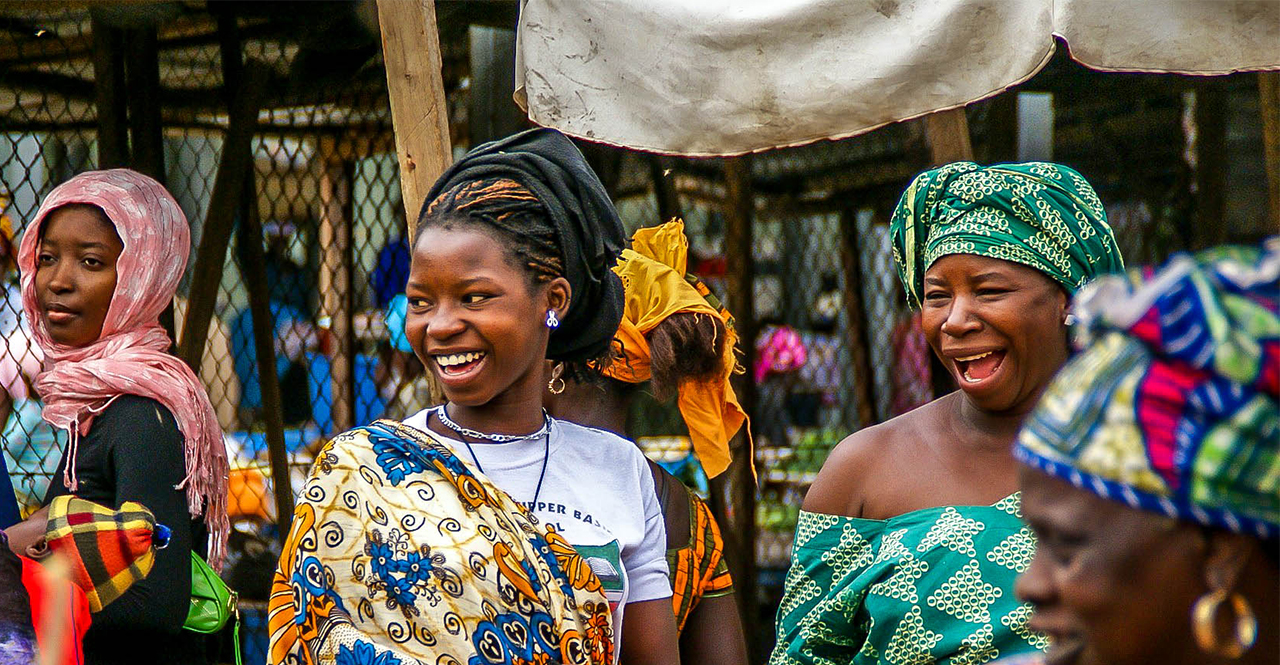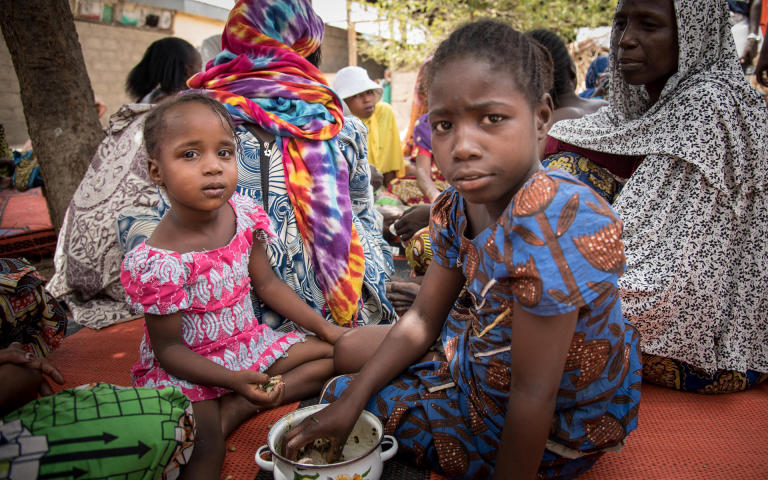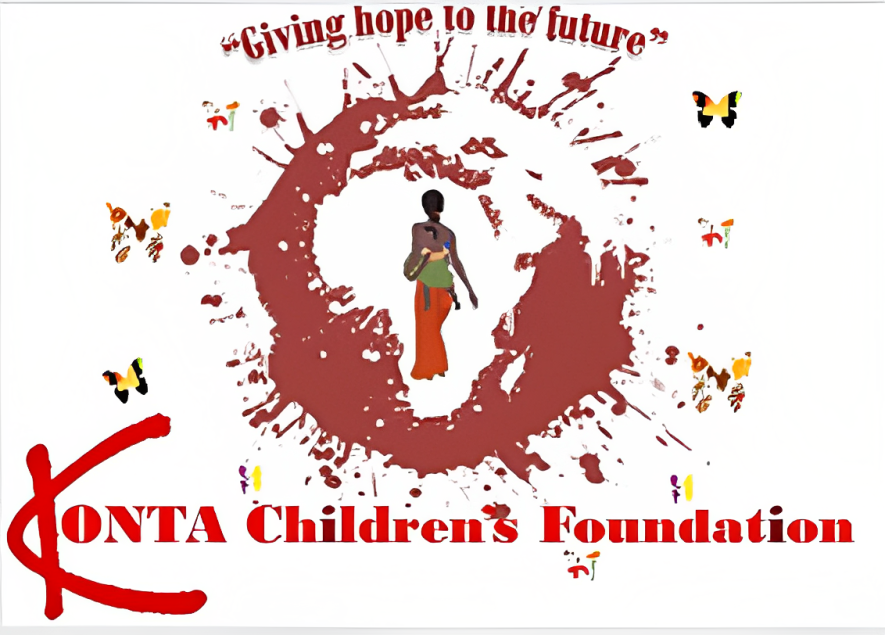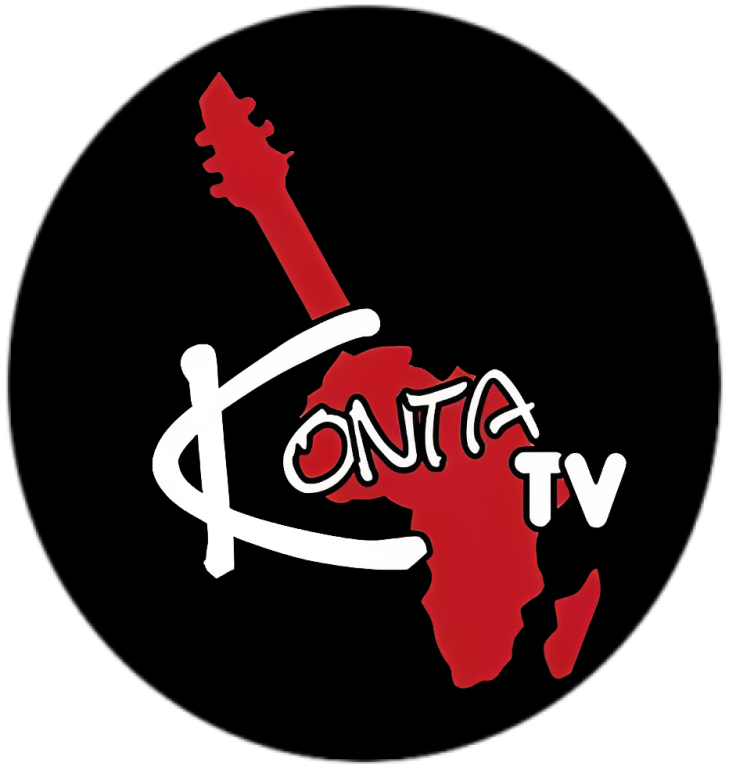AFRICAN MEDIA
We pride ourselves as being the world’s greatest and most informative online music and performance Channel. We cover all the latest trends in the musical arena and showcase all new artists that show the promise of being tomorrow’s superstars.
All innovative and alternative music and collaboration between artists from varying backgrounds are also covered, and we examine the new experimental sounds generated by such collaborations.
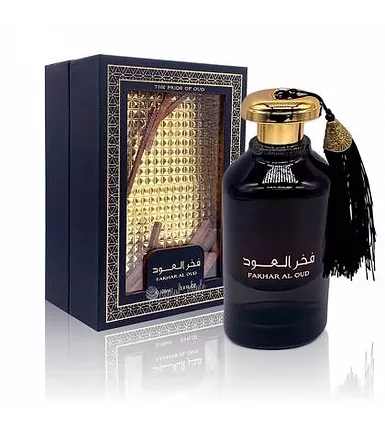
Latest NEWS of Africa
PICTURES
Legacy Program special event at the Ivory Coast Pavilion
The Vice President of the Republic, Mr. Tiémoko Meyliet Koné, this Sunday, December 3, 2023, in Dubai, United Arab Emirates, participated in the special event on the Legacy Program initiative which took place at the Pavillon Côte d’Ivoire, as part of the work of the 28th United Nations Conference of the Parties on Climate Change (COP28), in Dubai, United Arab Emirates.
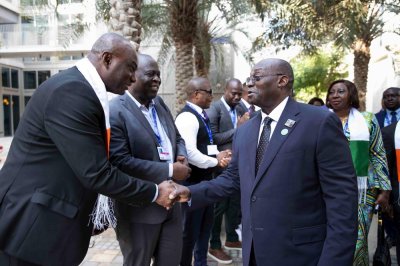
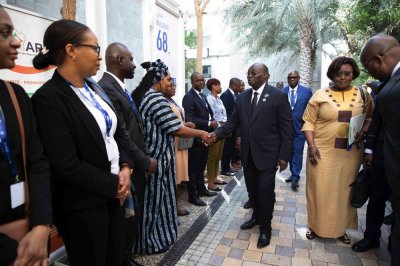
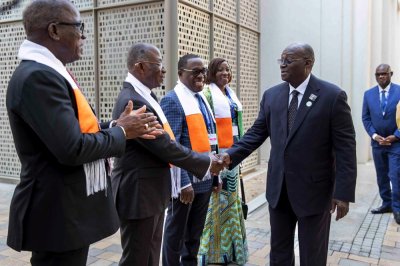
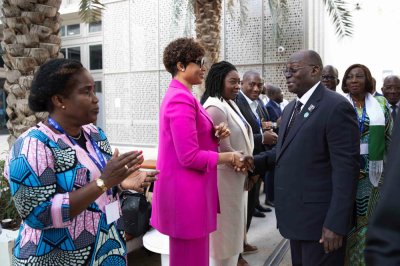
Recent NEWS
Newspaper
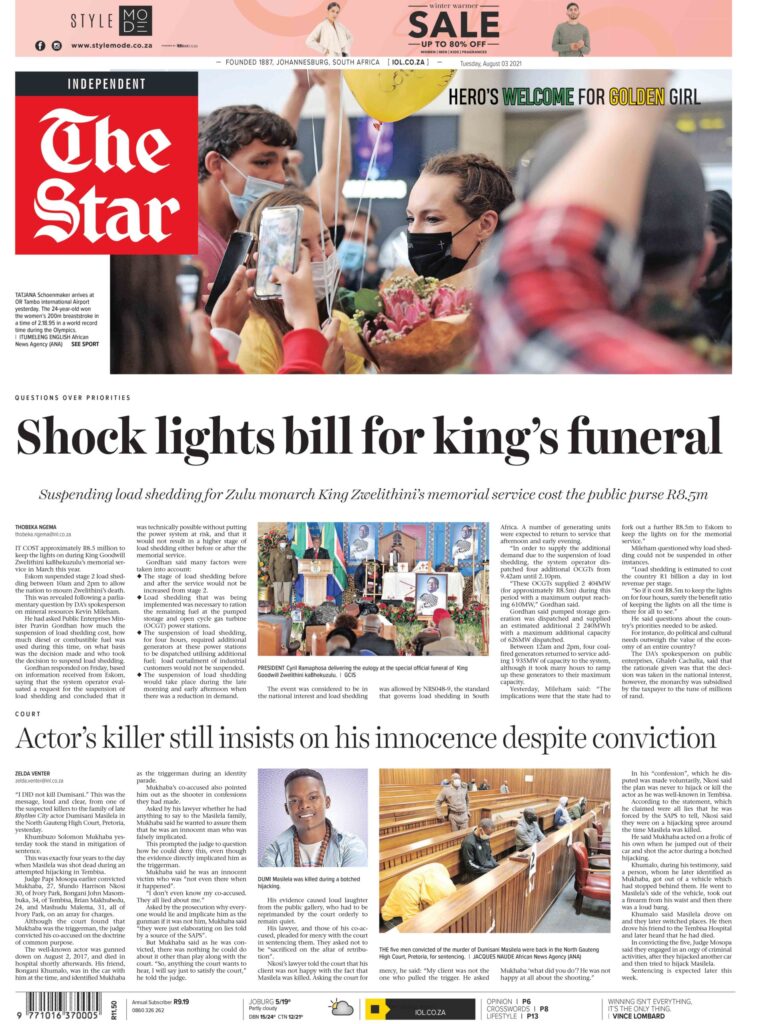


Senator Natasha lauds NDDC, NLNG partnership on local content
Senator Natasha Akpoti-Uduaghan, lawmaker representing Kogi Central senatorial district has commended the pact between Niger Delta Development Commission (NDDC) and Nigeria LNG Limited (NLNG), to develop local content capacity. Both NDDC and NLNG recently signed a Memorandum of Understanding (MoU) to leverage shared aspirations and collaborate on diverse fronts in
Shettima: We’re Taking Bold Steps to Change Nigeria’s Economic Fortune
Vice President Kashim Shettima, yesterday, said the President Bola Tinubu-led administration has so far taken bold and courageous decisions that would, in the long run, change Nigeria’s economic fortune for the better. This, he noted, formed the basis for the present administration’s determination to ensure youth empowerment and human capital
Nigeria Boasts Trade Surplus as Exports Hit N23.3trn in Nine Months
The National Bureau of Statistics (NBS) in a report revealed that Nigeria attained a notable trade surplus of N3.5 trillion between January and September 2023. NBS made this known in its foreign trade report for the third quarter of 2023 on Monday, noting that within this period, Nigeria’s exports amounted
‘Nigeria wants to qualify’– Coach Pitsomane eyes Jose Peseiro’s job
Jose Peseiro has faced a lot of criticism in the Nigerian football community following his team’s recent dismal performances Former Al Ahly manager, Pitso Mosimane, expressed his desire to coach a national team, highlighting his admiration for the Super Eagles of Nigeria, Soccernet.ng reports. Renowned for his successful stints at Al
No Worries, Nigeria Will Surpass OPEC’s 1.5m bpd Oil Quota in 2024
The Minister of State for Petroleum Resources (Oil), Senator Heineken Lokpobiri, said at the weekend that Nigeria remains on track to surpass the crude oil production quota handed down to the country by the Organisation of Petroleum Exporting Countries (OPEC).Last week, at the 36th OPEC and non-OPEC ministerial meeting, the
Construction Of Nigeria-Morocco Gas Project Begins In 2024 – FG
November 27, (THEWILL) – The Federal Government has said the construction of the Nigeria-Morocco Gas Pipeline Project is expected to begin in 2024. Minister of State, Petroleum Resources (Gas), Ekperikpe Ekpo, disclosed this on Monday, in Abuja while receiving a delegation of envoys from the Kingdom of Morocco, led by its
Konta TV NEWS channel aims to provide comprehensive coverage of the latest news from African countries. Our team is dedicated to delivering high-quality content with prompt service. We appreciate your viewership. Konta TV NEWS channel excels in promoting African countries and offers a comprehensive range of news coverage. Our team is putting in tremendous efforts to achieve the top position among news channels. MR Almani Konta dedicates his time and effort tirelessly to his work to witness his channel reaching its pinnacle.
In the past few years, there has been a significant rise in the significance of news broadcasts. KONTA TV Channel is also doing a great job to attract number of audience. A growing number of individuals require access to the news in order to stay informed about global affairs. Consequently, numerous television channels have emerged to provide viewers with a wider range of news coverage. Both commercial and government networks are utilized to disseminate news to the general public. However, due to varying sources of funding and target audiences, different networks prioritize different aspects of the news to attract as many viewers from their target audience as possible. As a result, these distinct channels can attract a much larger audience and potentially draw viewers away from other channels, thereby reducing competition.
Categories
Ivory Coast
Ivory Coast (Cote d’Ivoire) People and Culture
People
The population of the Ivory Coast is approx 20.3 million people (recorded in 2013).
There are more than 60 ethnic groups, the key ones being the Baoulé in the center, the Agri in the east, the Senufo in the north, the Dioula in the northwest and west, the Bété in the center-west and the Dan-Yacouba in the west. Houphouët-Boigny promoted his own group, the Baoulé, who account for 23% of the population. The succession of Konan Bédié, another Baoulé, has annoyed many groups, the Bété in particular.
Migrants from other west African countries account for up to 40% of the population.
Akan
Among the Akan-speaking peoples of southern Ghana and adjacent Côte d’Ivoire ritual pottery and figurative terracottas are used in connection with funeral practices that date at least to the 1600s.
Akye
Akye are an Akan peoples living in southern Côte d’Ivoire. The rise of the early Akan centralized states can be traced to the 13th century and is likely related to the opening of trade routes established to move gold throughout the region.
Anyi
The most important art forms among the Anyi are funerary images and monuments. A family can demonstrate its affluence through grave monuments to the ancestors.
Aowin
Aowin are an Akan peoples living in southern Côte d’Ivoire. The rise of the early Akan centralized states can be traced to the 13th century and is likely related to the opening of trade routes established to move gold throughout the region.
Baule (Baoulé)
The Baule belong to the Akan peoples who inhabit Ghana and Côte d’Ivoire. Three hundred years ago the Baule people migrated westward from Ghana when the Asante rose to power. The tale of how they broke away from the Asante has been preserved in their oral traditions.
Dan
The Dan are an extremely musical people. They don’t do anything without music. Rice, Death, Marriage, Birth, Weather are all celebrated with music.
Senufo
The Senufo are made up of a number of diverse subgroups who migrated into their current location from the north during the 15th and 16th centuries.
Languages
National or official language is French.
Religion
12% Christian
25% Muslim
63% Traditional Beliefs
The majority practise traditional religions involving ancestral worship. They believe that the dead are transformed into spirits and remain in constant contact with the living; through various rituals, the living seek their blessings and protection. Magic is also common, and good magic keeps evil spirits away.
Medicine men or juju priests dispense charms, tell fortunes and give advice on how to avoid danger. They also bless grisgris, necklaces of charms that ward off specific evils. The Senoufo people in particular have held very strongly to their traditional beliefs. Children are instructed over many years in the history and social mores of the Senoufo and are then secretly initiated.
Festivals and Events
One of Côte d’Ivoire’s most famous festivals is the Fêtes des Masques (Festival of Masks), which takes place in the region of Man. Numerous small villages in the region hold contests to determine the best dancers and to pay homage to forest spirits who are embodied in the elaborate masks.
Another important event is the week long carnival in Bouaké each March.
In April, the Fête du Dipri in Gomon, near Abidjan. This festival starts around midnight, when women and children sneak out of their huts and, naked, carry out nocturnal rites to exorcise the village of evil spells. Before sunrise the chief appears, drums pound and villagers go into trances. The frenzy continues until late afternoon of the next day.
The major Muslim holiday is Ramadan, when everyone fasts between sunup and sunset in accordance with the fourth pillar of Islam. Ramadan ends with a huge feast, Eid al-Fitr, where everyone prays together, visits friends, gives presents and stuffs themselves.
Cooking and Recipies
The traditional diet in Cote d’Ivoire is very similar to that of neighboring countries in its reliance on grains and tubers, but the Ivorians have a particular kind of small, open-air restaurant called a maquis which is unique to them.
Attiéké (grated cassava) is a popular Côte d’Ivoirian side dish. Côte d’Ivoire’s claim to culinary fame, maquis normally feature braised chicken and fish smothered in onions and tomatoes, served with attiéké, or kedjenou, a chicken dish made with vegetables and a mild sauce.
One of the tastiest street-vended foods is aloco, which is ripe banana in palm oil, spiced with steamed onions and chilli and eaten alone or with grilled fish. Bangui is a local palm wine.
Music
World famous reggae artist Alpha Blondy is Côte d’Ivoire’s best known singer, though his music isn’t necessarily representative.
The country’s traditional music style is characterised by a series of melodies and rhythms occurring simultaneously, without one dominating the others. The Dan are an extremely musical people. They don’t do anything without music. Rice, Death, Marriage, Birth, Weather are all celebrated with music
Historically, this music has been the prerogative of just one social group, the griot (village entertainers), who use only instruments they can make with local materials, such as gourds, animal skins and horns. instruments used include Talking drum, djembe, Kpalogo, Shekere (Youroo), Akombe, Cleavers
Art and Craft
The Baoulé, the Dan (or Yacouba) and the Senoufo – all known for their wooden carvings.
No one produces a wider variety of masks than the people of the Ivory Coast. Masks are used to represent the souls of deceased people, lesser dieties, or even caricatures of animals. The ownership of masks is restricted to certain powerful individuals or to families. Only specifically designated, specially trained individuals are permitted to wear the masks.
It is dangerous for others to wear ceremonial masks because each mask has a soul, or life force, and when a person’s face comes in contact with the inside of the mask that person is transformed into the entity the mask represents.
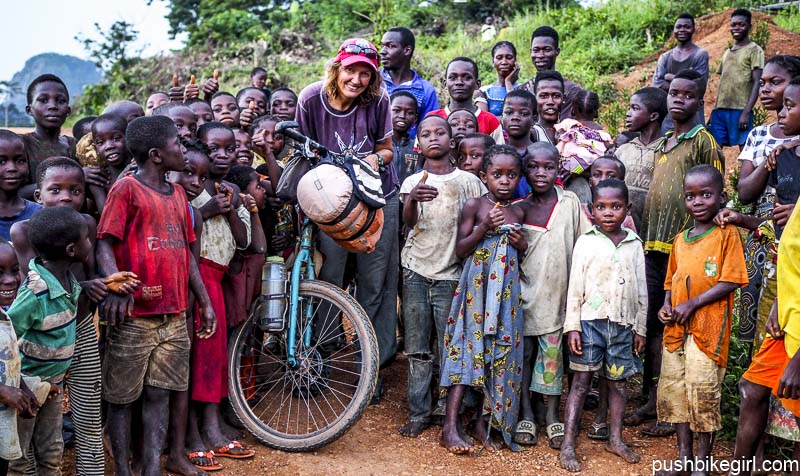
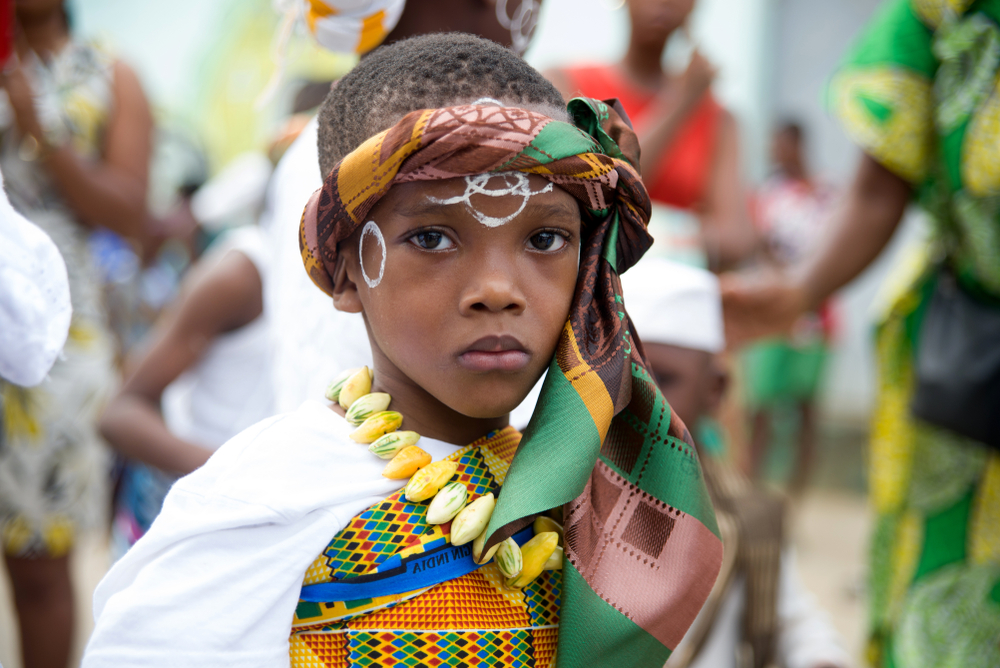
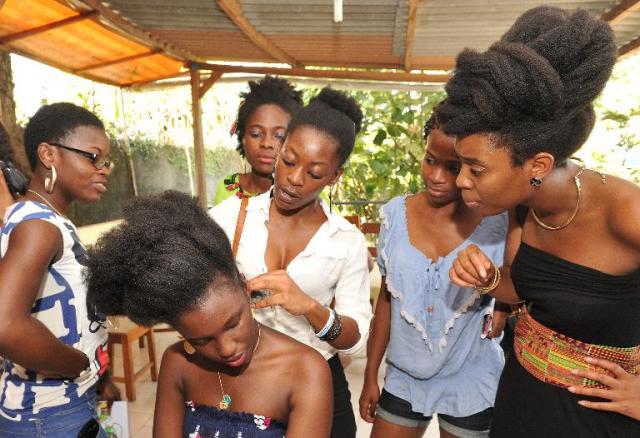
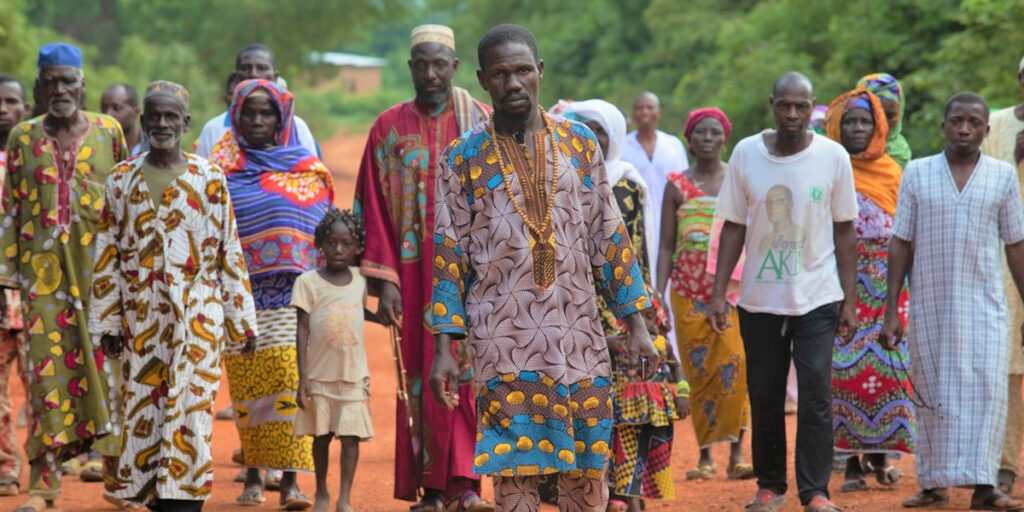
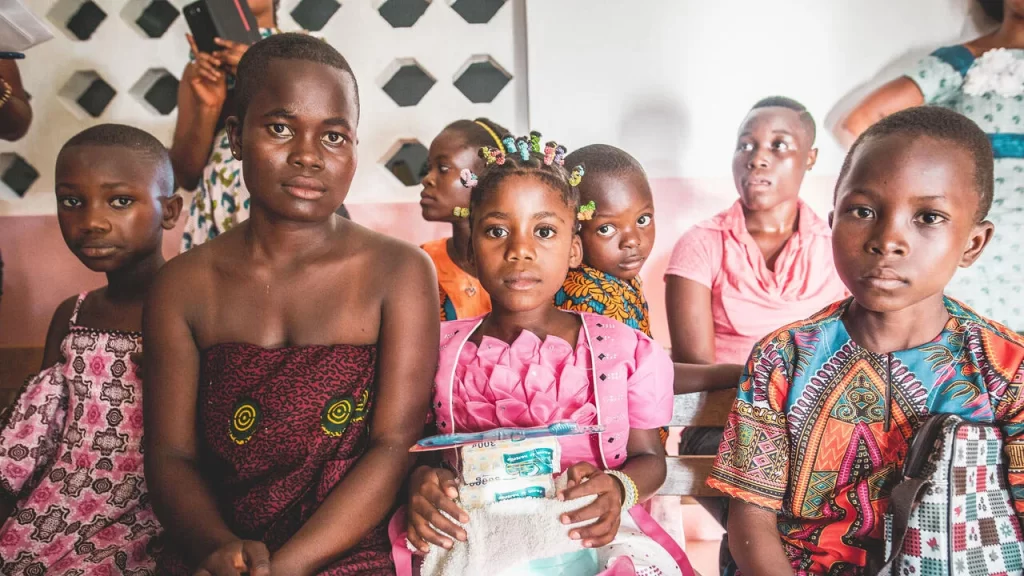
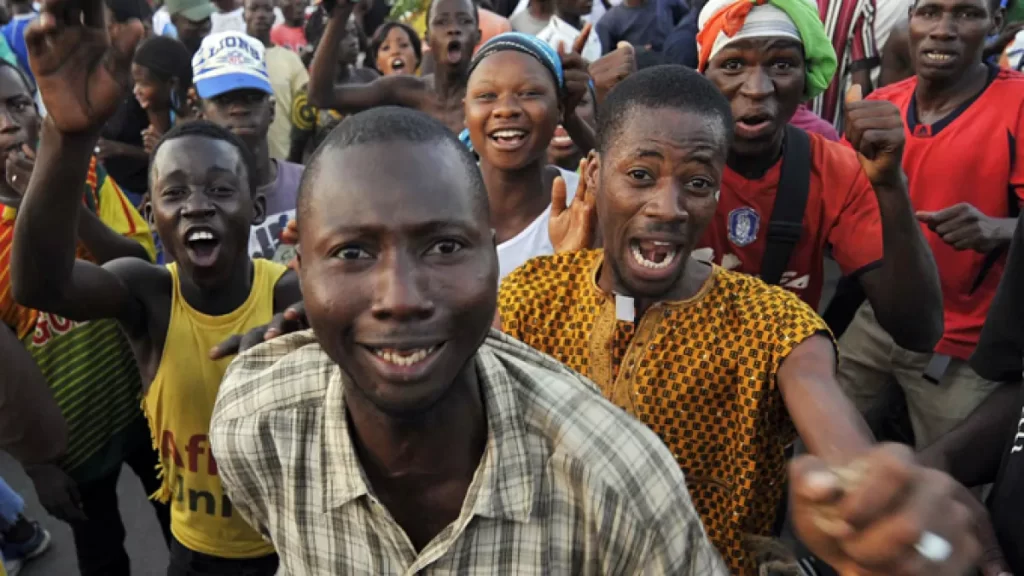
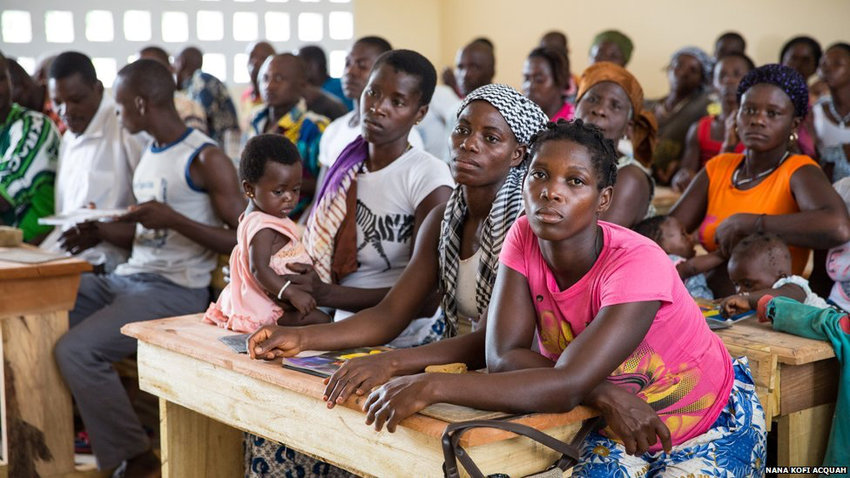
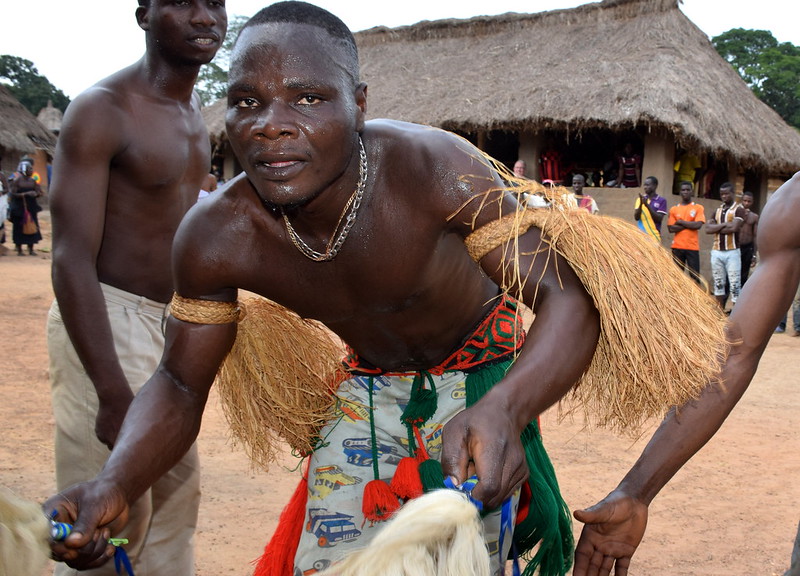
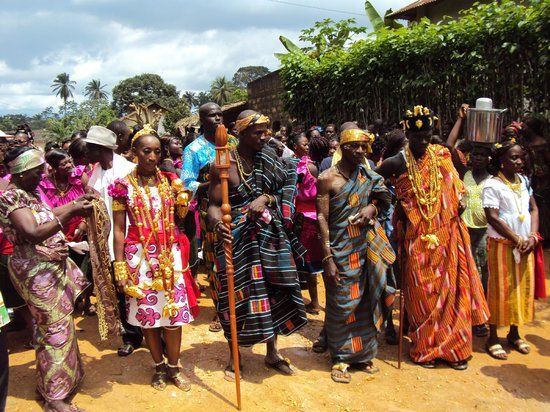
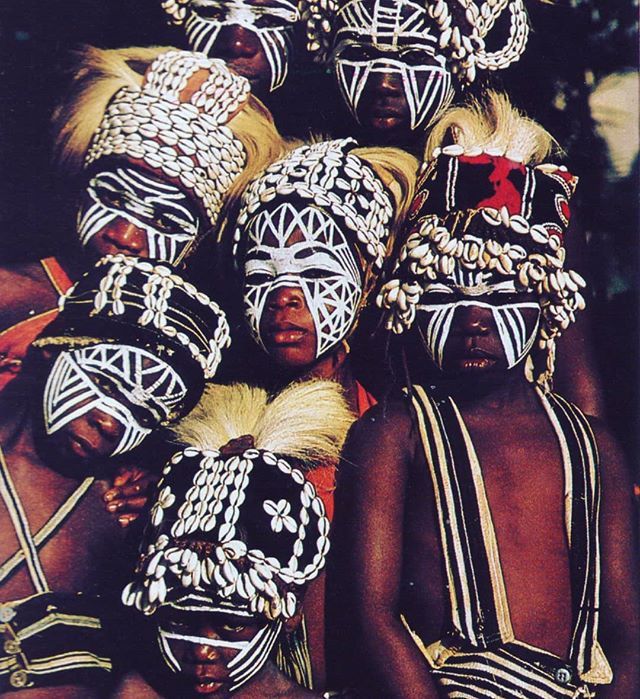

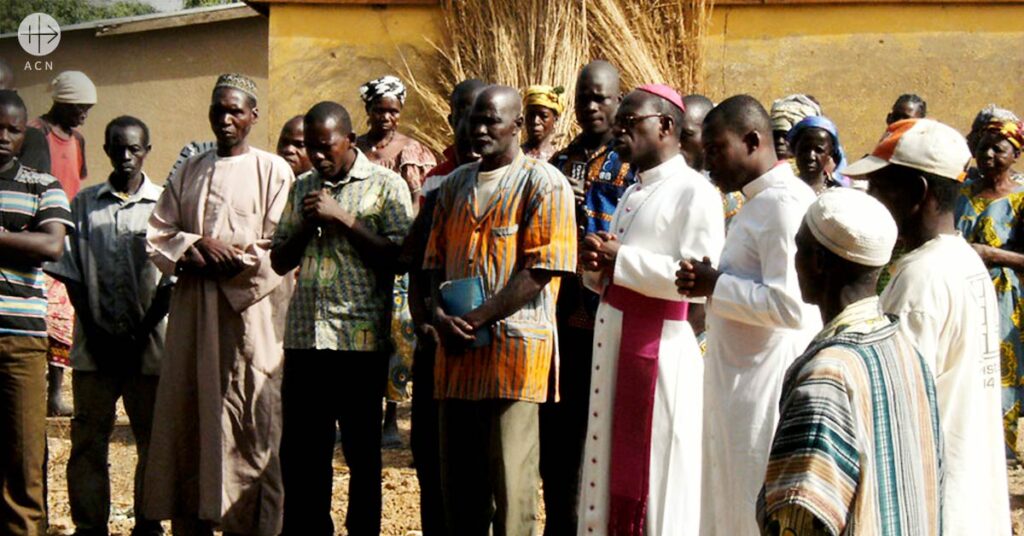

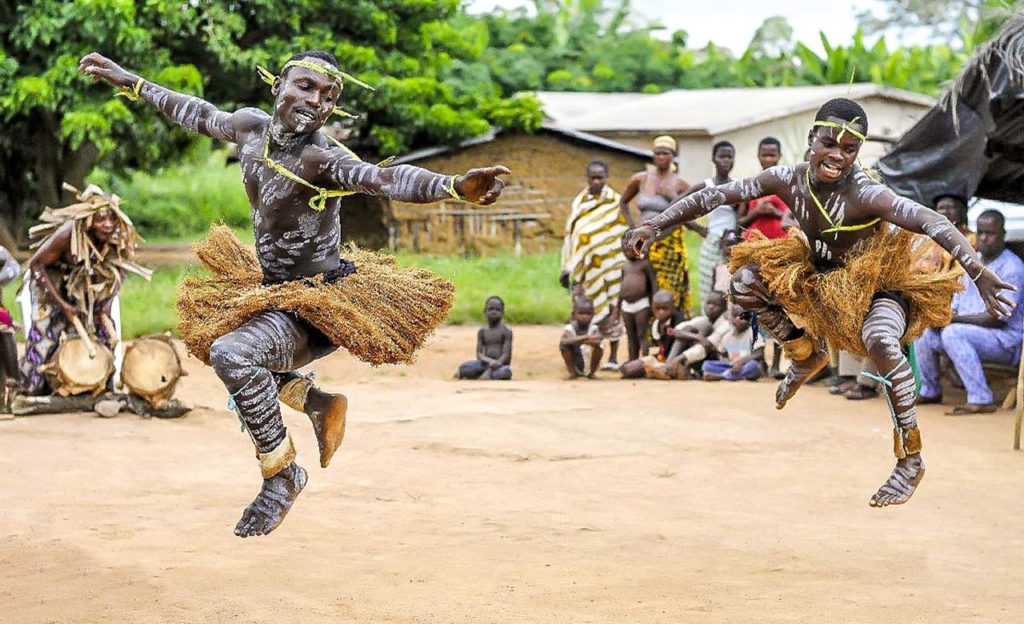
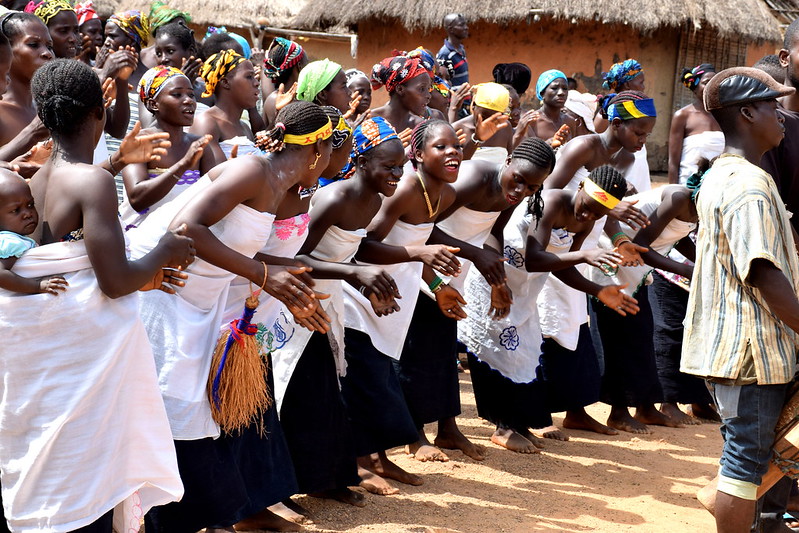
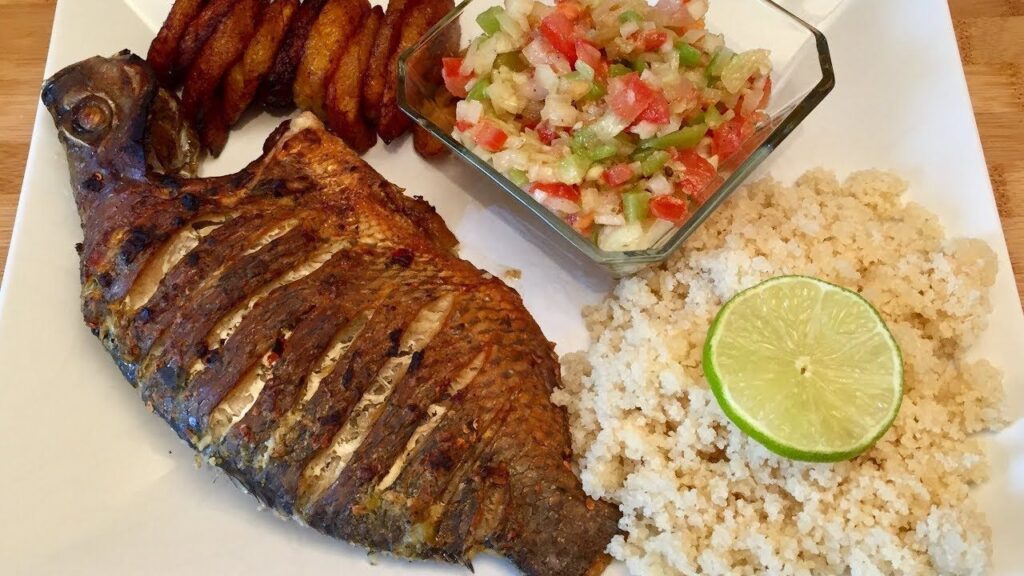

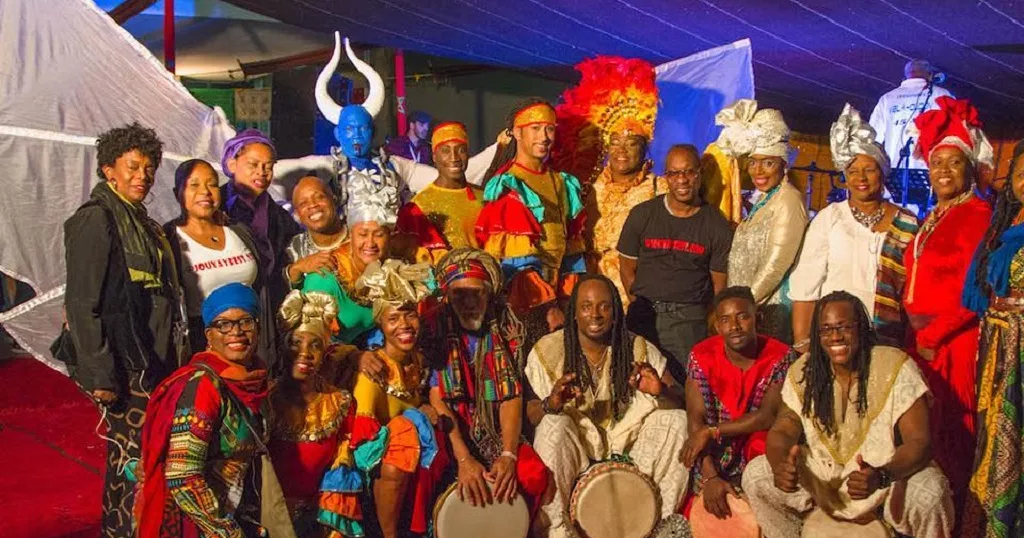
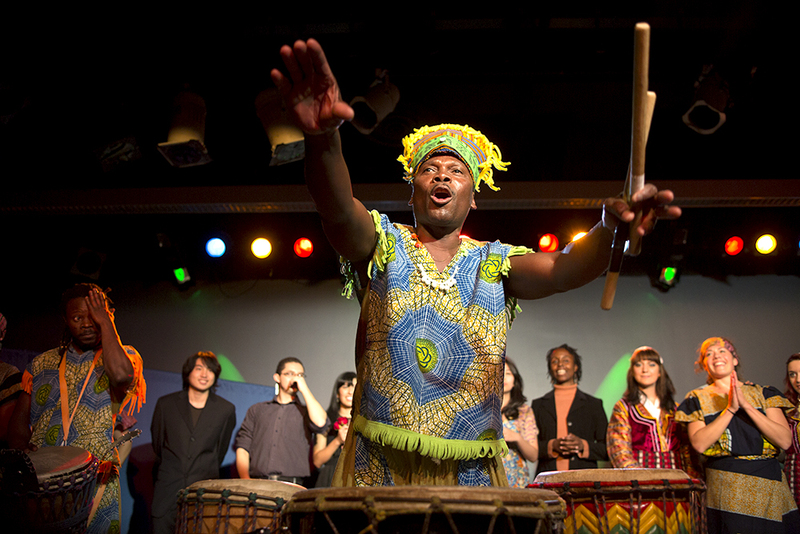
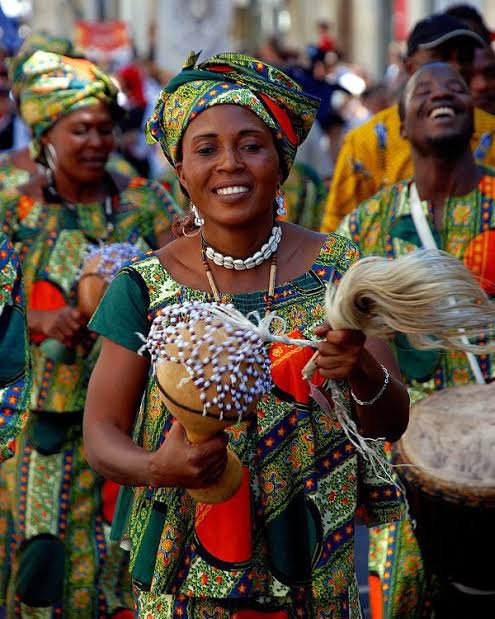
Cameroon
Facts and Statistics
- Location: Western Africa, bordering the Bight of Biafra, between Equatorial Guinea and Nigeria
- Capital: Yaounde
- Climate: varies with terrain, from tropical along coast to semiarid and hot in north
- Population: 25,640,965 (est. 2018)
- Ethnic Make-up: Cameroon Highlanders 31%, Equatorial Bantu 19%, Kirdi 11%, Fulani 10%, Northwestern Bantu 8%, Eastern Nigritic 7%, other African 13%, non-African less than 1%
- Religions: indigenous beliefs 40%, Christian 40%, Muslim 20%
Government: republic; multiparty presidential regime
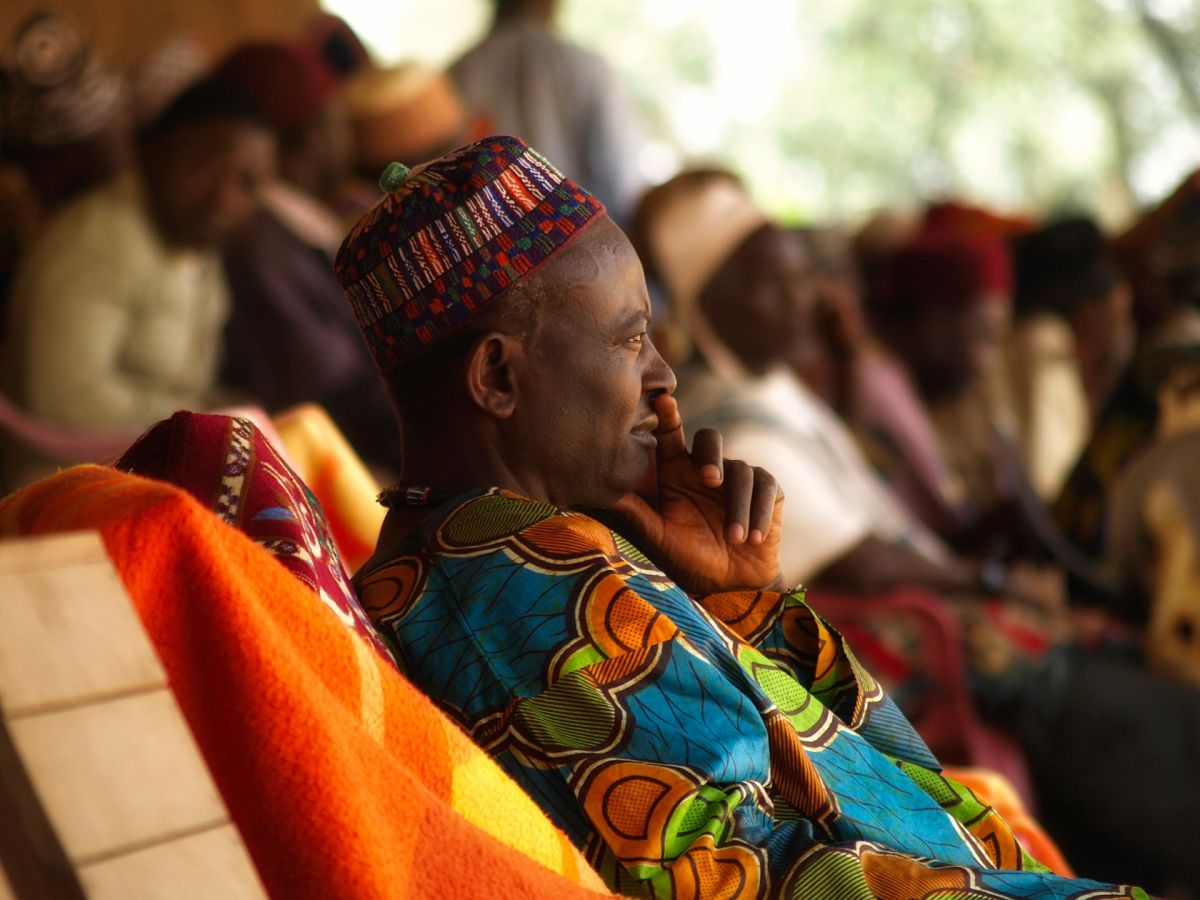
A man from the Besali located in the lower Mundani. Photo by Vincent Lockhart on Unsplash
Language in Cameroon
- Cameroon is home to 230 languages. These include 55 Afro-Asiatic languages, two Nilo-Saharan languages, and 173 Niger-Congo languages. This latter group is divided into one West Atlantic language (Fulfulde), 32 Adamawa-Ubangui languages, and 142 Benue-Congo languages (130 of which are Bantu languages).
- English and French are official languages, a heritage of Cameroon’s colonial past as both a colony of the United Kingdom and France from 1916 to 1960.
- The nation strives toward bilingualism, but in reality, very few Cameroonians speak both French and English, and many speak neither. In an effort to increase levels of French and English understanding, the government has established several bilingual schools.
- Cameroon is a member of both the Commonwealth of Nations and La Francophonie.
- Kamtok, or Pidgin English, has in many ways been the lingua franca of Cameroon since the 1880s. It is commonly used as a vehicle for enhancing communication in this bilingual country that has approximately 250 native dialects. There are several variations on Kamtok based upon where it is used: in grass fields, in the Catholic Church, in the Francophone areas of the country, in the southwest of the country, and among the Bororo cattle traders.
Cameroonian Society and Culture
The People
- Cameroon has a diverse population comprising approximately 250 ethnic groups that then form 5 regional/cultural groups.
- These are western highlanders (also called grassfielders), which include the Bamileke, Bamoun, and many smaller groups in the northwest; coastal tropical forest people, which include the Bassa, Doula, and many smaller groups in the southwest; southern tropical forest people, which include the Beti, Beulu, Fang, and Pygmies; Muslims of the northern semi-arid regions and central highlands, which include the Fulani; and the Kirdi, non-Muslims peoples of the northern desert and central highlands.
Religion
- The constitution guarantees freedom of religion.
- About 40% of the population follows some form of indigenous beliefs, 40% adhere to a form of Christianity, and 20% are Muslim.
- The various religious groups get along reasonably well, although there have been some problems reported by religious minorities in various parts of the country.
- The north of the country is primarily Muslim while the south tends to have more Christians.

The Family
- The extended family is the focus of the social system. It is the extended family and includes grandparents, cousins, aunts, uncles, etc. Members of the extended family are considered as close as the nuclear family is in the West.
- Family obligations take precedence over pretty much everything else in life. Individuals achieve recognition and social standing through their extended family. The young are expected to care for elderly members of the extended family; retirement homes are an alien concept.
- As with many family orientated cultures nepotism does not have the negative connotation. In fact, hiring relatives is part of the cultural context since it not only provides for the family, but also ensures that Cameroonians work with those they know and trust.
- Cameroonians who have a common background tend to organize themselves into small groups commonly called associations. Individual members refer to themselves as sons and daughters of a given community.
- Associations handle two major financial activities. A trouble bank is a special assistance fund to which every member contributes money at regular intervals and from which money is given to members who fall victim to a misfortune.
- A “njangi” is a financial activity similar to a bank based on mutual trust. An unemployed but hard-working association member who does not own property or real estate may receive a loan from the njangi.
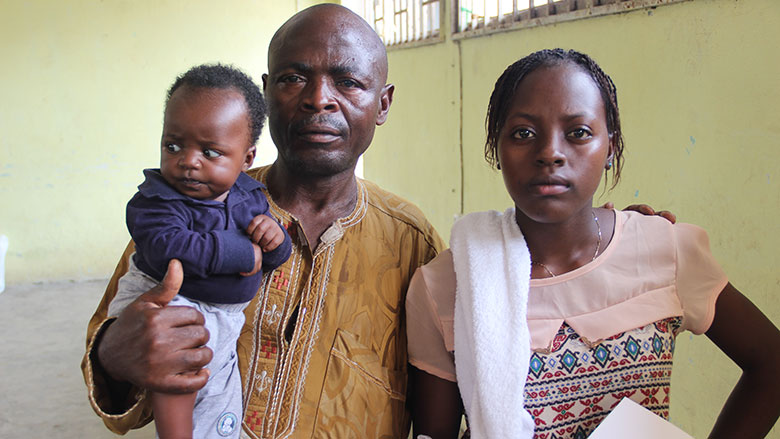

Etiquette and Manners in Cameroon
Meeting and Greeting
- Cameroonian greetings vary between the Francophone and Anglophone areas.
- In both areas, men shake hands with each other.
- In the Francophone south, close friends may embrace while brushing cheeks and kissing the air along with a handshake.
- In the Anglophone north, close friends have a unique handshake in which, as they pull their hands back they snap the other person’s middle finger with their thumb.
- As a sign of respect men often lower their head and avert their eyes when greeting someone superior to them in age or position.
- Some Muslims will not shake hands across genders.
- Since this is a hierarchical society, elders are greeted first.
- Women tend not to look the other person in the eye even if it is another woman.
- Greetings should never be rushed. It is important to take time to inquire about the person’s family and other matters of general interest during the greeting process.
Gift Giving Etiquette
- If you are invited to a Cameroonian’s home, bring fruit, whiskey, or wine to the host.
- Do not bring alcohol if the host is Muslim.
- A small gift for the children is always a nice touch. School materials or sweets are standard.
- Gifts are not always opened when received.
- Gifts are given with two hands or the right hand only; never the left hand.
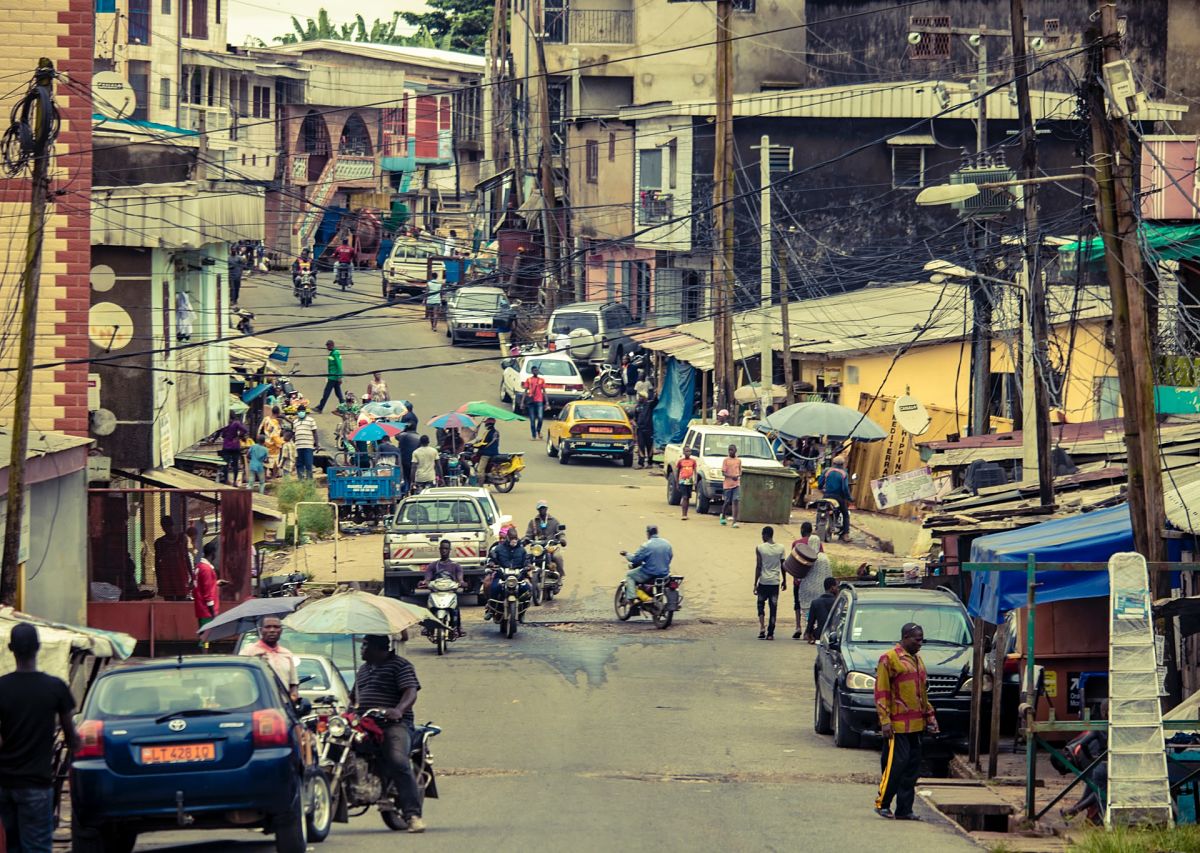
A street scene captured in Bessengue, Douala by Edouard TAMBA on Unsplash
Dining Etiquette
If you are invited to a Cameroonian’s house:
- Dress well – this demonstrates respect towards your hosts.
- Shake hands with each guest individually starting with the most senior people present.
- Do not discuss business during a social function.
- The home is private. Do not ask for a tour.
- Cameroonians are somewhat formal and believe good table manners demonstrate respect.
- When in doubt, watch what others do and emulate their behaviour.
- In traditional homes, men eat first, then women, and then children. A foreign woman will generally be invited to eat with the men since she is a guest.
- In many homes, a washing basin and soap is brought out before the meal so that guests may wash their hands.
- Expect to have your own shallow bowl and to take food from a communal bowl.
- Hierarchy dictates that the eldest person is the first to take food from the communal bowl.
- Many Cameroonians eat with their hands, although foreign guests may be offered cutlery.
- If you use your hands then use the right hand.
- As a guest, you will be offered prized delicacies such as chicken gizzards. This is considered an honour. If you cannot eat them, thank your host profusely and request that it is more appropriate that it be given to the eldest person present.
Business Culture and Etiquette in Cameroon
Meeting Etiquette
- Much of the information in the general etiquette section applies here.
- It is important to use a person’s honorific title and surname when conversing. Government officials may be addressed as “Excellency” without using their surname.
- Honorific and professional titles in French or English should be used in the appropriate area of the country.
- Wait to be invited before moving to a first name basis.
- Business cards are given without formal ritual.
- Present and receive business cards with the right hand only or with both hands.
- Present your card so it is readable to the recipient.
- Make a point of studying any business card you receive. It is a common practice to comment on some of the information or the card design.
Business Meetings
- Meetings are not as private as those in Europe or North America may be used to. The room can actually be shared with other people or people may walk into a meeting half-way through and interrupt. One should not take this as a sign of disrespect or lack of seriousness; once the interruption is over things will get back on track
- Agendas are really part of the Cameroonian business culture. If used they generally act as a starting point for discussions rather than a map.
- There is a formal nature to meetings in Cameroon. It is suggested that you not remove your suit jacket unless invited to do so, as this is seen as too casual.
- Business communication is relatively formal and follows rules of etiquette and protocol. It is rude to turn your back on someone who is senior to you, even if it is merely to shake hands with someone else.
- Cameroonians are expressive communicators who practice conversational overlap – when they think that they know what you are about to say, they will interrupt you to agree, disagree, or change the subject. Many Cameroonians use proverbs when speaking to enhance their communication.
Facts and Statistics
- Location: Western Africa, bordering the Bight of Biafra, between Equatorial Guinea and Nigeria
- Capital: Yaounde
- Climate: varies with terrain, from tropical along coast to semiarid and hot in north
- Population: 25,640,965 (est. 2018)
- Ethnic Make-up: Cameroon Highlanders 31%, Equatorial Bantu 19%, Kirdi 11%, Fulani 10%, Northwestern Bantu 8%, Eastern Nigritic 7%, other African 13%, non-African less than 1%
- Religions: indigenous beliefs 40%, Christian 40%, Muslim 20%
Government: republic; multiparty presidential regime

A man from the Besali located in the lower Mundani. Photo by Vincent Lockhart on Unsplash
Language in Cameroon
- Cameroon is home to 230 languages. These include 55 Afro-Asiatic languages, two Nilo-Saharan languages, and 173 Niger-Congo languages. This latter group is divided into one West Atlantic language (Fulfulde), 32 Adamawa-Ubangui languages, and 142 Benue-Congo languages (130 of which are Bantu languages).
- English and French are official languages, a heritage of Cameroon’s colonial past as both a colony of the United Kingdom and France from 1916 to 1960.
- The nation strives toward bilingualism, but in reality, very few Cameroonians speak both French and English, and many speak neither. In an effort to increase levels of French and English understanding, the government has established several bilingual schools.
- Cameroon is a member of both the Commonwealth of Nations and La Francophonie.
- Kamtok, or Pidgin English, has in many ways been the lingua franca of Cameroon since the 1880s. It is commonly used as a vehicle for enhancing communication in this bilingual country that has approximately 250 native dialects. There are several variations on Kamtok based upon where it is used: in grass fields, in the Catholic Church, in the Francophone areas of the country, in the southwest of the country, and among the Bororo cattle traders.
Cameroonian Society and Culture
The People
- Cameroon has a diverse population comprising approximately 250 ethnic groups that then form 5 regional/cultural groups.
- These are western highlanders (also called grassfielders), which include the Bamileke, Bamoun, and many smaller groups in the northwest; coastal tropical forest people, which include the Bassa, Doula, and many smaller groups in the southwest; southern tropical forest people, which include the Beti, Beulu, Fang, and Pygmies; Muslims of the northern semi-arid regions and central highlands, which include the Fulani; and the Kirdi, non-Muslims peoples of the northern desert and central highlands.
Religion
- The constitution guarantees freedom of religion.
- About 40% of the population follows some form of indigenous beliefs, 40% adhere to a form of Christianity, and 20% are Muslim.
- The various religious groups get along reasonably well, although there have been some problems reported by religious minorities in various parts of the country.
- The north of the country is primarily Muslim while the south tends to have more Christians.

The Family
- The extended family is the focus of the social system. It is the extended family and includes grandparents, cousins, aunts, uncles, etc. Members of the extended family are considered as close as the nuclear family is in the West.
- Family obligations take precedence over pretty much everything else in life. Individuals achieve recognition and social standing through their extended family. The young are expected to care for elderly members of the extended family; retirement homes are an alien concept.
- As with many family orientated cultures nepotism does not have the negative connotation. In fact, hiring relatives is part of the cultural context since it not only provides for the family, but also ensures that Cameroonians work with those they know and trust.
- Cameroonians who have a common background tend to organize themselves into small groups commonly called associations. Individual members refer to themselves as sons and daughters of a given community.
- Associations handle two major financial activities. A trouble bank is a special assistance fund to which every member contributes money at regular intervals and from which money is given to members who fall victim to a misfortune.
- A “njangi” is a financial activity similar to a bank based on mutual trust. An unemployed but hard-working association member who does not own property or real estate may receive a loan from the njangi.

Etiquette and Manners in Cameroon
Meeting and Greeting
- Cameroonian greetings vary between the Francophone and Anglophone areas.
- In both areas, men shake hands with each other.
- In the Francophone south, close friends may embrace while brushing cheeks and kissing the air along with a handshake.
- In the Anglophone north, close friends have a unique handshake in which, as they pull their hands back they snap the other person’s middle finger with their thumb.
- As a sign of respect men often lower their head and avert their eyes when greeting someone superior to them in age or position.
- Some Muslims will not shake hands across genders.
- Since this is a hierarchical society, elders are greeted first.
- Women tend not to look the other person in the eye even if it is another woman.
- Greetings should never be rushed. It is important to take time to inquire about the person’s family and other matters of general interest during the greeting process.
Gift Giving Etiquette
- If you are invited to a Cameroonian’s home, bring fruit, whiskey, or wine to the host.
- Do not bring alcohol if the host is Muslim.
- A small gift for the children is always a nice touch. School materials or sweets are standard.
- Gifts are not always opened when received.
- Gifts are given with two hands or the right hand only; never the left hand.

A street scene captured in Bessengue, Douala by Edouard TAMBA on Unsplash
Dining Etiquette
If you are invited to a Cameroonian’s house:
- Dress well – this demonstrates respect towards your hosts.
- Shake hands with each guest individually starting with the most senior people present.
- Do not discuss business during a social function.
- The home is private. Do not ask for a tour.
- Cameroonians are somewhat formal and believe good table manners demonstrate respect.
- When in doubt, watch what others do and emulate their behaviour.
- In traditional homes, men eat first, then women, and then children. A foreign woman will generally be invited to eat with the men since she is a guest.
- In many homes, a washing basin and soap is brought out before the meal so that guests may wash their hands.
- Expect to have your own shallow bowl and to take food from a communal bowl.
- Hierarchy dictates that the eldest person is the first to take food from the communal bowl.
- Many Cameroonians eat with their hands, although foreign guests may be offered cutlery.
- If you use your hands then use the right hand.
- As a guest, you will be offered prized delicacies such as chicken gizzards. This is considered an honour. If you cannot eat them, thank your host profusely and request that it is more appropriate that it be given to the eldest person present.
Business Culture and Etiquette in Cameroon
Meeting Etiquette
- Much of the information in the general etiquette section applies here.
- It is important to use a person’s honorific title and surname when conversing. Government officials may be addressed as “Excellency” without using their surname.
- Honorific and professional titles in French or English should be used in the appropriate area of the country.
- Wait to be invited before moving to a first name basis.
- Business cards are given without formal ritual.
- Present and receive business cards with the right hand only or with both hands.
- Present your card so it is readable to the recipient.
- Make a point of studying any business card you receive. It is a common practice to comment on some of the information or the card design.
Business Meetings
- Meetings are not as private as those in Europe or North America may be used to. The room can actually be shared with other people or people may walk into a meeting half-way through and interrupt. One should not take this as a sign of disrespect or lack of seriousness; once the interruption is over things will get back on track
- Agendas are really part of the Cameroonian business culture. If used they generally act as a starting point for discussions rather than a map.
- There is a formal nature to meetings in Cameroon. It is suggested that you not remove your suit jacket unless invited to do so, as this is seen as too casual.
- Business communication is relatively formal and follows rules of etiquette and protocol. It is rude to turn your back on someone who is senior to you, even if it is merely to shake hands with someone else.
- Cameroonians are expressive communicators who practice conversational overlap – when they think that they know what you are about to say, they will interrupt you to agree, disagree, or change the subject. Many Cameroonians use proverbs when speaking to enhance their communication.
Ghana
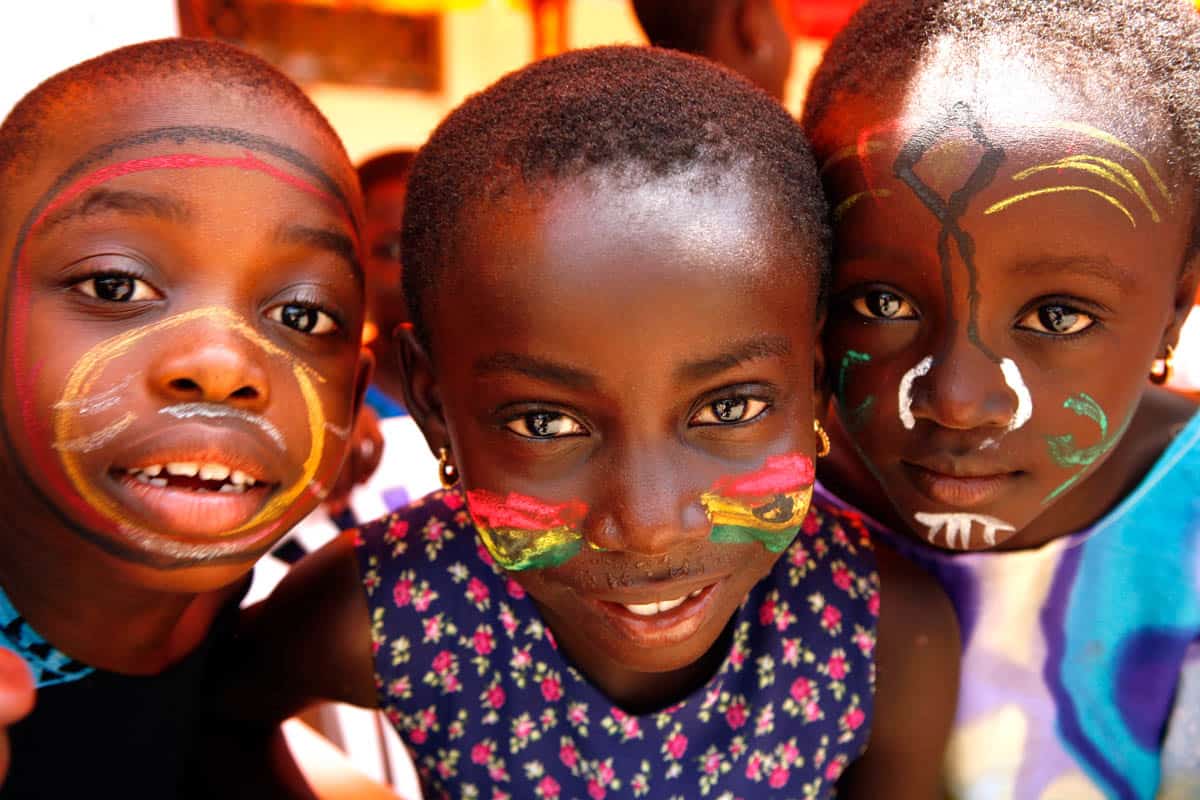
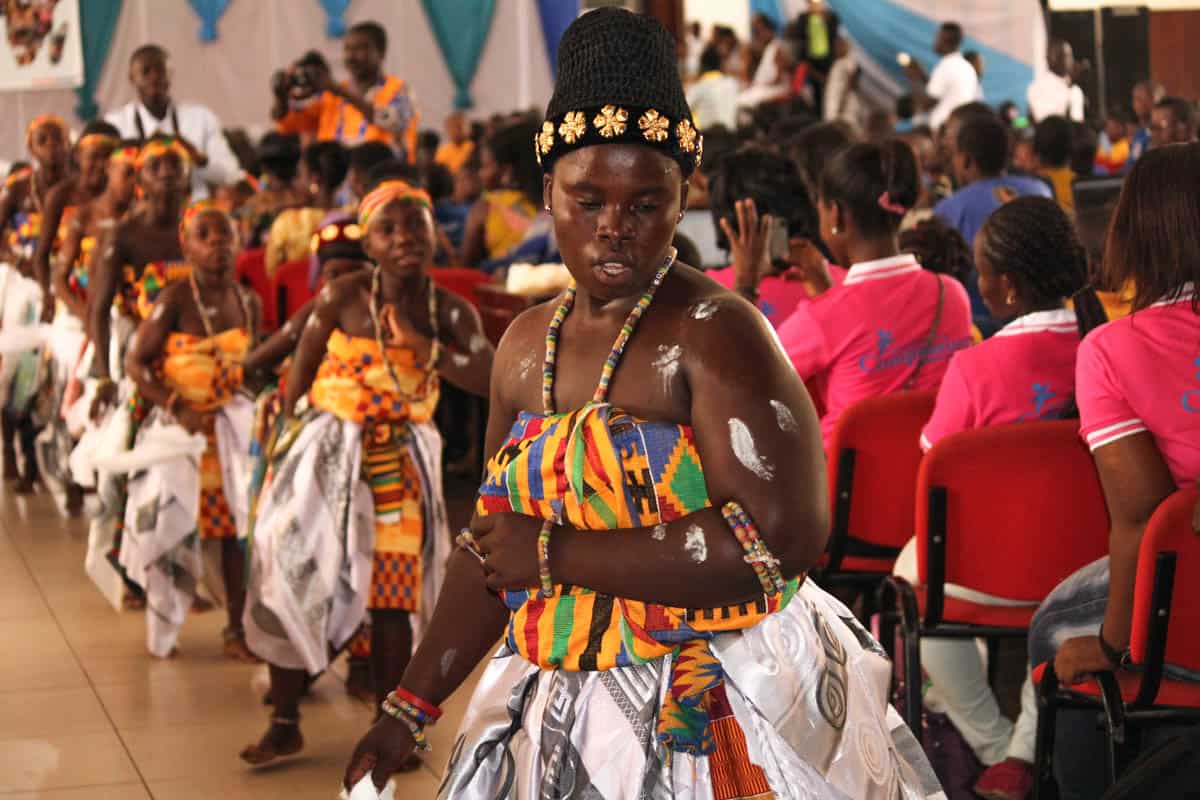
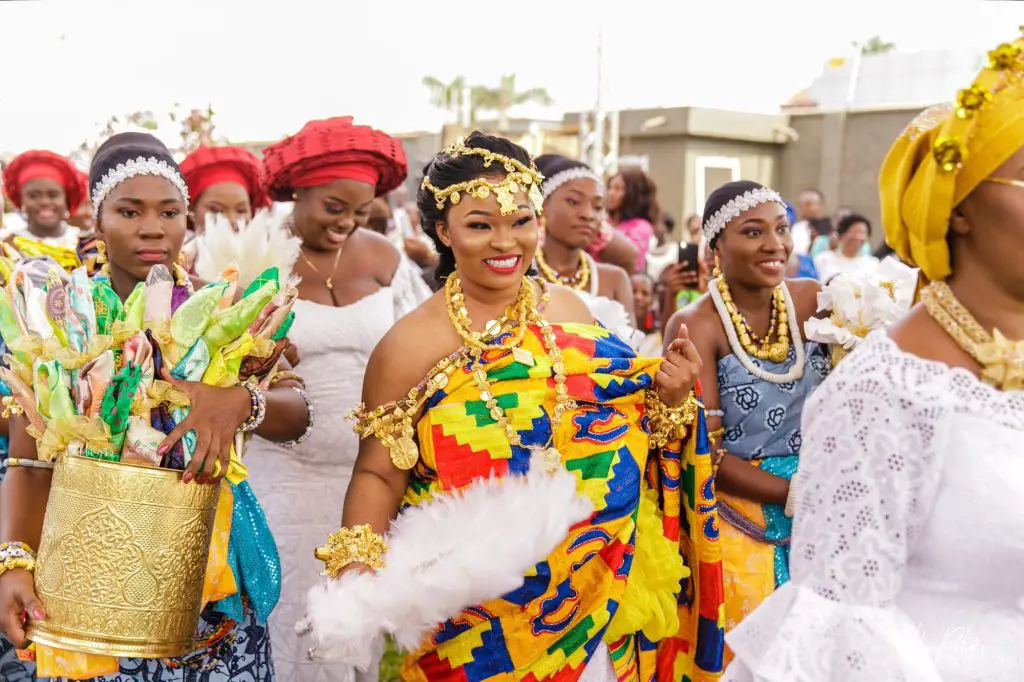
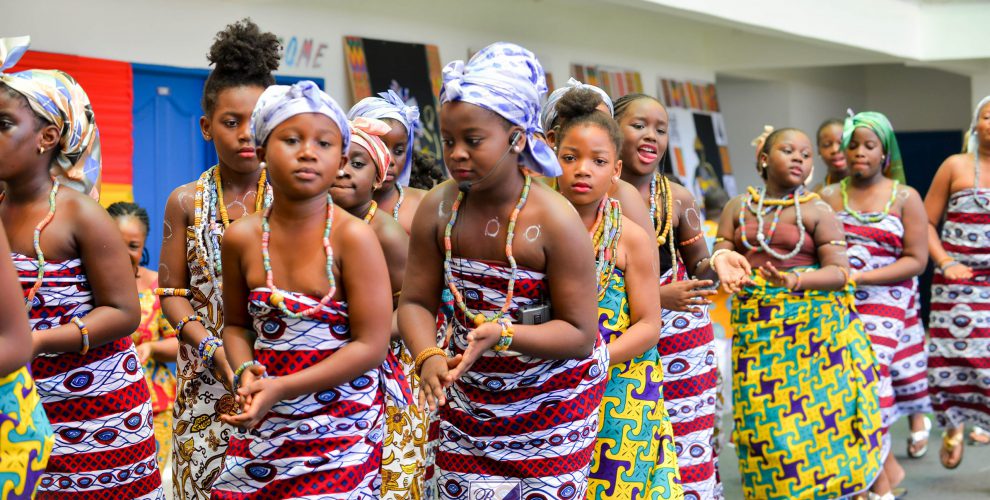
People and Community
Host families in Ghana are typically large, with several generations living in the same home or compound. By nature, Ghanaians are warm, friendly and hospitable. Although Ghanaians tend to be laid-back, families may be quite strict and protective of their children. Most Ghanaian families do not allow their children to sleep over at friends’ homes. In most Ghanaian families, household chores are normally gender specific, except homes where all the children are of one gender, thus girls are expected to help with cooking and sweeping outside the house and boys sweep the living room and wash the family car (if there is any).
In Ghana’s culture, it is common to find a strong sense of community and great respect for the elderly. Young people refer to adults as “auntie” and “uncle” (or “grandma” and “grandpa” for older people). Outdoor dining is popular, with families cooking meals and socializing in the courtyard. In most families, it is considered rude to spend a lot of time in one’s bedroom alone. Family members usually spend time together by watching TV during the evenings or attend church, funerals or weddings during the weekends. Drinking of alcohol and smoking is totally forbidden in Ghanaian homes.

Language and Communication Styles
Official Language
The various Ghanaian Ethnic Groups speak over ninety languages and dialects. Some of the languages are Akan, Moshi-Dagomba Ewe and Ga. English is the official language of Ghana.
Communication Style
Ghanaians have an indirect communication style and do not typically state what they really think, especially when they are talking to somebody in a higher position of power.
In Ghana’s culture, greetings are important. Whenever one passes a group of people, especially the elderly, it is expected to always greet them. To fail to greet is considered an insult, and not easily over-looked. When walking up to a group of people, it is polite to always greet and shake hands if possible. Time is always made for greeting and it is not seen as interference or waste of time.
It is considered respectful to use formal titles when addressing someone. Anyone older than oneself must be addressed as “brother” or “sister” at the very least. Elderly people should be addressed with titles of respect like “father, mother, grandfather, sir, or madam.”
Showing affection in public between men and women is not acceptable, even husband and wives. Men may hold hands (no sexual implications) or even hug, but male/female relationships are strictly controlled. Hugging is not commonly done except by very dear friends, especially between men and women. Loud, boisterous behavior is also considered poor taste, especially for women. In public, it is best to display a quiet, careful, and friendly attitude.

Food in Ghana
Food in Ghana tends to be hot and spicy, with ingredients like yams, cassava, maize, beans, plantains, and rice. Tropical fruits and vegetables supplement the diet. The mainstays of Ghanaian cuisine are sauces, usually eaten with rice. Popular Ghanaian dishes include fufu, (a loved staple for most of West Africa) which is mashed ball made of cassava, yam or plantain that has been cooked and pounded into a semi-plastic state, Ghanaian red-red--beans, shrimp or prawns, red palm oil, and tomatoes, and custard melkkos–custard with cinnamon.
Other types of dishes usually served in Ghana are kenkey–traditionally prepared by boiling balls of mixed portions of fermented cooked maize meal and raw maize dough wrapped in dried cornhusk, banku – fermented corn / cassava dough, cooked in hot water into a smooth whitish paste, and gari – made from fresh cassava which is grated and squeezed of excess liquid. The remaining grated cassava is then fried over an open fire on a broad metal pan. The resulting product is crispy and crunchy to taste and is stored easily and can be eaten with stew or soup and fish.
Street shops and markets are often filled with fresh foods with local taste. A popular dessert is fried plantain seasoned with chili pepper and ginger called kelewele.


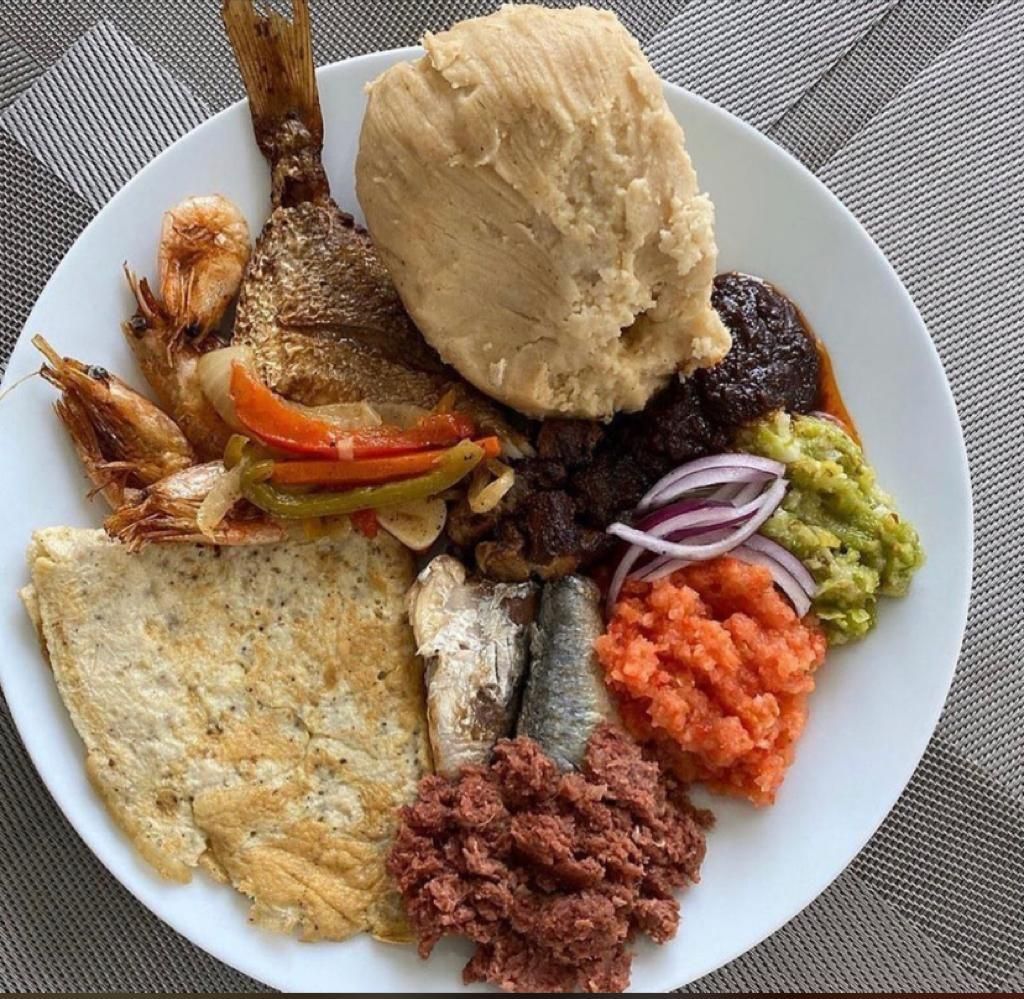


People and Community
Host families in Ghana are typically large, with several generations living in the same home or compound. By nature, Ghanaians are warm, friendly and hospitable. Although Ghanaians tend to be laid-back, families may be quite strict and protective of their children. Most Ghanaian families do not allow their children to sleep over at friends’ homes. In most Ghanaian families, household chores are normally gender specific, except homes where all the children are of one gender, thus girls are expected to help with cooking and sweeping outside the house and boys sweep the living room and wash the family car (if there is any).
In Ghana’s culture, it is common to find a strong sense of community and great respect for the elderly. Young people refer to adults as “auntie” and “uncle” (or “grandma” and “grandpa” for older people). Outdoor dining is popular, with families cooking meals and socializing in the courtyard. In most families, it is considered rude to spend a lot of time in one’s bedroom alone. Family members usually spend time together by watching TV during the evenings or attend church, funerals or weddings during the weekends. Drinking of alcohol and smoking is totally forbidden in Ghanaian homes.

Language and Communication Styles
Official Language
The various Ghanaian Ethnic Groups speak over ninety languages and dialects. Some of the languages are Akan, Moshi-Dagomba Ewe and Ga. English is the official language of Ghana.
Communication Style
Ghanaians have an indirect communication style and do not typically state what they really think, especially when they are talking to somebody in a higher position of power.
In Ghana’s culture, greetings are important. Whenever one passes a group of people, especially the elderly, it is expected to always greet them. To fail to greet is considered an insult, and not easily over-looked. When walking up to a group of people, it is polite to always greet and shake hands if possible. Time is always made for greeting and it is not seen as interference or waste of time.
It is considered respectful to use formal titles when addressing someone. Anyone older than oneself must be addressed as “brother” or “sister” at the very least. Elderly people should be addressed with titles of respect like “father, mother, grandfather, sir, or madam.”
Showing affection in public between men and women is not acceptable, even husband and wives. Men may hold hands (no sexual implications) or even hug, but male/female relationships are strictly controlled. Hugging is not commonly done except by very dear friends, especially between men and women. Loud, boisterous behavior is also considered poor taste, especially for women. In public, it is best to display a quiet, careful, and friendly attitude.

Food in Ghana
Food in Ghana tends to be hot and spicy, with ingredients like yams, cassava, maize, beans, plantains, and rice. Tropical fruits and vegetables supplement the diet. The mainstays of Ghanaian cuisine are sauces, usually eaten with rice. Popular Ghanaian dishes include fufu, (a loved staple for most of West Africa) which is mashed ball made of cassava, yam or plantain that has been cooked and pounded into a semi-plastic state, Ghanaian red-red--beans, shrimp or prawns, red palm oil, and tomatoes, and custard melkkos–custard with cinnamon.
Other types of dishes usually served in Ghana are kenkey–traditionally prepared by boiling balls of mixed portions of fermented cooked maize meal and raw maize dough wrapped in dried cornhusk, banku – fermented corn / cassava dough, cooked in hot water into a smooth whitish paste, and gari – made from fresh cassava which is grated and squeezed of excess liquid. The remaining grated cassava is then fried over an open fire on a broad metal pan. The resulting product is crispy and crunchy to taste and is stored easily and can be eaten with stew or soup and fish.
Street shops and markets are often filled with fresh foods with local taste. A popular dessert is fried plantain seasoned with chili pepper and ginger called kelewele.



People and Community
Host families in Ghana are typically large, with several generations living in the same home or compound. By nature, Ghanaians are warm, friendly and hospitable. Although Ghanaians tend to be laid-back, families may be quite strict and protective of their children. Most Ghanaian families do not allow their children to sleep over at friends’ homes. In most Ghanaian families, household chores are normally gender specific, except homes where all the children are of one gender, thus girls are expected to help with cooking and sweeping outside the house and boys sweep the living room and wash the family car (if there is any).
In Ghana’s culture, it is common to find a strong sense of community and great respect for the elderly. Young people refer to adults as “auntie” and “uncle” (or “grandma” and “grandpa” for older people). Outdoor dining is popular, with families cooking meals and socializing in the courtyard. In most families, it is considered rude to spend a lot of time in one’s bedroom alone. Family members usually spend time together by watching TV during the evenings or attend church, funerals or weddings during the weekends. Drinking of alcohol and smoking is totally forbidden in Ghanaian homes.

Language and Communication Styles
Official Language
The various Ghanaian Ethnic Groups speak over ninety languages and dialects. Some of the languages are Akan, Moshi-Dagomba Ewe and Ga. English is the official language of Ghana.
Communication Style
Ghanaians have an indirect communication style and do not typically state what they really think, especially when they are talking to somebody in a higher position of power.
In Ghana’s culture, greetings are important. Whenever one passes a group of people, especially the elderly, it is expected to always greet them. To fail to greet is considered an insult, and not easily over-looked. When walking up to a group of people, it is polite to always greet and shake hands if possible. Time is always made for greeting and it is not seen as interference or waste of time.
It is considered respectful to use formal titles when addressing someone. Anyone older than oneself must be addressed as “brother” or “sister” at the very least. Elderly people should be addressed with titles of respect like “father, mother, grandfather, sir, or madam.”
Showing affection in public between men and women is not acceptable, even husband and wives. Men may hold hands (no sexual implications) or even hug, but male/female relationships are strictly controlled. Hugging is not commonly done except by very dear friends, especially between men and women. Loud, boisterous behavior is also considered poor taste, especially for women. In public, it is best to display a quiet, careful, and friendly attitude.

Food in Ghana
Food in Ghana tends to be hot and spicy, with ingredients like yams, cassava, maize, beans, plantains, and rice. Tropical fruits and vegetables supplement the diet. The mainstays of Ghanaian cuisine are sauces, usually eaten with rice. Popular Ghanaian dishes include fufu, (a loved staple for most of West Africa) which is mashed ball made of cassava, yam or plantain that has been cooked and pounded into a semi-plastic state, Ghanaian red-red--beans, shrimp or prawns, red palm oil, and tomatoes, and custard melkkos–custard with cinnamon.
Other types of dishes usually served in Ghana are kenkey–traditionally prepared by boiling balls of mixed portions of fermented cooked maize meal and raw maize dough wrapped in dried cornhusk, banku – fermented corn / cassava dough, cooked in hot water into a smooth whitish paste, and gari – made from fresh cassava which is grated and squeezed of excess liquid. The remaining grated cassava is then fried over an open fire on a broad metal pan. The resulting product is crispy and crunchy to taste and is stored easily and can be eaten with stew or soup and fish.
Street shops and markets are often filled with fresh foods with local taste. A popular dessert is fried plantain seasoned with chili pepper and ginger called kelewele. 

Nigeria
Nigerian Culture, Customs, And Traditions
Nigeria is a multiethnic country in Northern Africa. With nearly 200 million inhabitants, it also happens to be one of the world’s largest countries by population. The culture of the country is diverse and tends to differ from north to south. Below are some of the most notable things about Nigerian culture.

Nigeria Traditions
Nigerian traditions are wide and vary in the different cultures. For example, it is typical for Nigerians to have three weddings, unless they are getting married to foreigners. The first wedding is traditional, the second one being in a court, while the third is in the church or the mosque. The rationale behind these weddings is that the union needs to be recognized by religion, the law, and by tradition. Other traditions include the mother-in-law helping the daughter-in-law after giving birth and younger men going for apprenticeships with older and wealthier men.
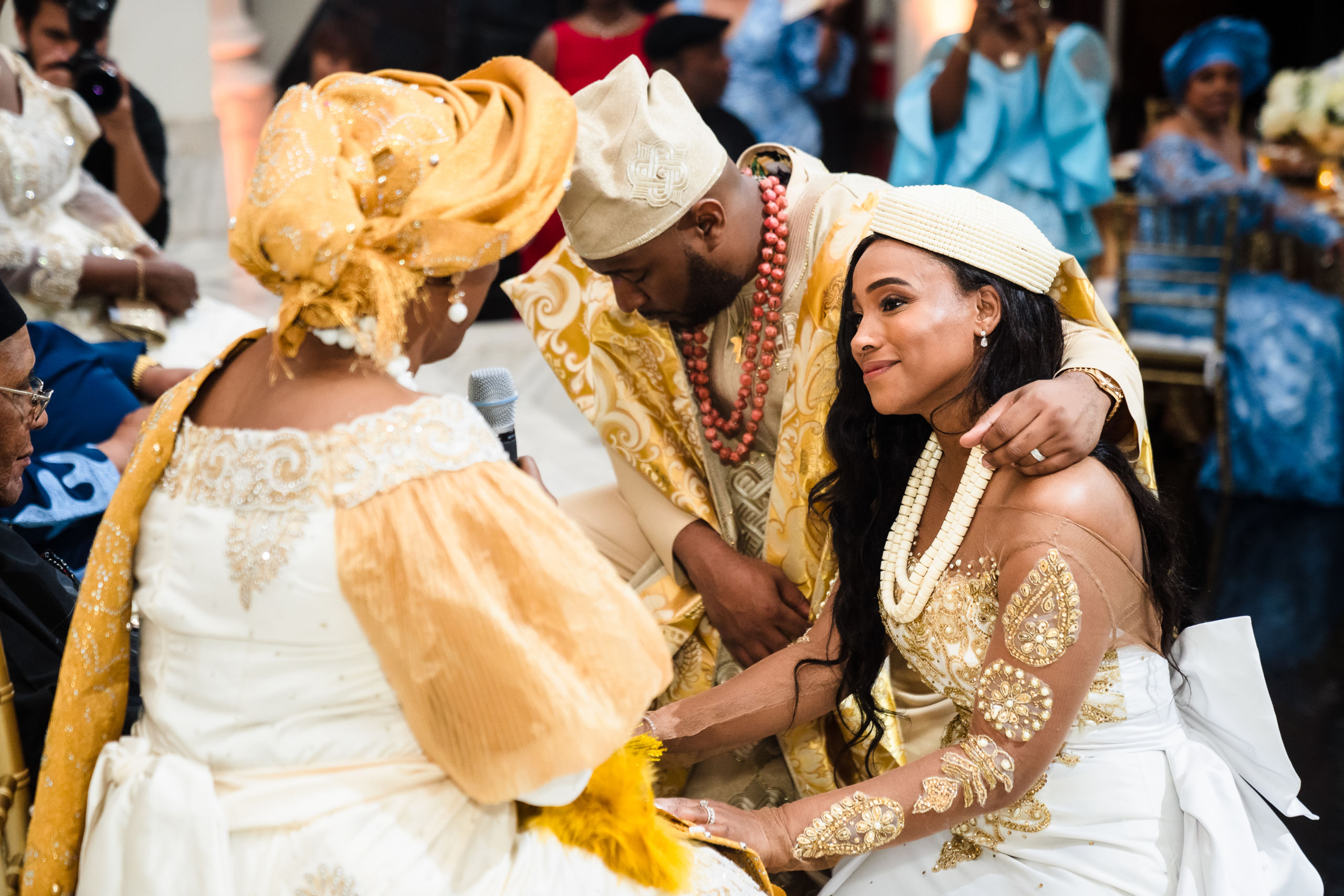
Nigerian Food
Nigerian food is mostly made up of meals that are high in carbohydrates, such as cassavas, rice, maize, yams, and plenty of vegetables. There are many ways that these meals are prepared. For example, the cassavas can be ground up and the flour used to make a delicious and inexpensive porridge. The yams can be mashed or fried in oil. Meat is another delicacy that is prepared into something known as suya (a form of meat resembling barbecue meat) and wild meat (from giraffes and antelopes). Most of the foods are spicy, especially in the west and the south. Other forms of traditional food include fufu, eba, okra, egusi, and ogbono. Drinks include traditional brews like palm wine.
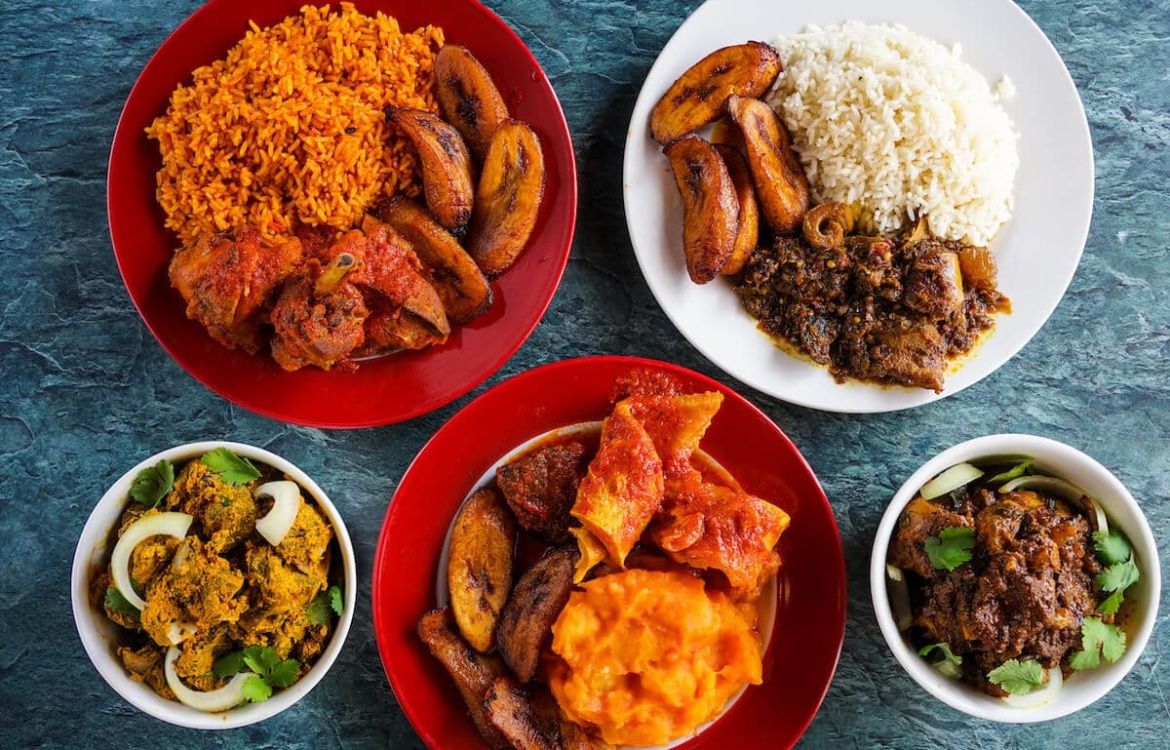
Nigerian Clothing
Nigeria itself is home to several textile industries that go towards clothing the Nigerian people. Fashion is diverse and varies depending on the ethnic groups, culture, and religion. In recent time, the styles have evolved to more contemporary designs. Traditionally, cultures such as the Yoruba used to wear clothing such as gele (a cloth wrapped around the head by women), afbada (a robe for formal functions), and other forms of attire. Other cultures, such as the Igbo used to wear clothes only for modesty in past times, which is unlike other cultures where clothing has always been a symbol of status.

Family Life
Families are a crucial aspect of Nigerian society and are typically larger than in the west. The larger number of families is because a higher number of children improves the social standing of a man. For this reason, newborns are regarded with joy and pride as they are the future. In some of Nigeria’s northern states, polygamy is legal and men may marry several wives. However, none of the states in southern Nigeria allow this practice.
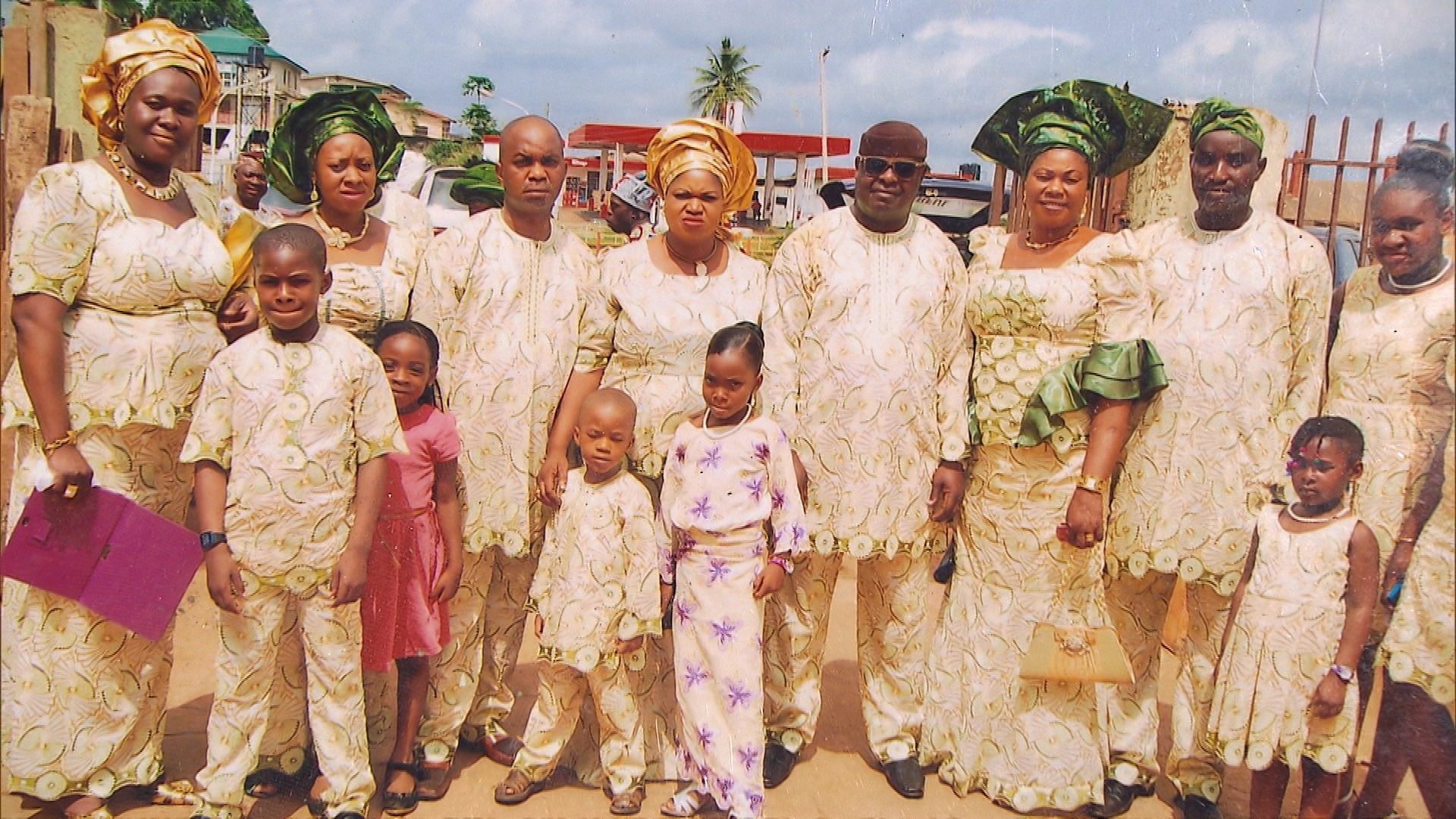
Language
Nigeria’s culture is made up of several ethnic groups that speak 527 different languages. The number of ethnic groups and dialects stand at more than 1,150. Some of the most prominent ethnic groups include the likes of the Fulani, Hausa, Igbo, Yoruba, and Ijaw. Minority ethnic groups live throughout the nation although higher concentrations of these groups live in the northern and the middle regions of Nigeria.
Nigerian Culture, Customs, And Traditions
Nigeria is a multiethnic country in Northern Africa. With nearly 200 million inhabitants, it also happens to be one of the world’s largest countries by population. The culture of the country is diverse and tends to differ from north to south. Below are some of the most notable things about Nigerian culture.
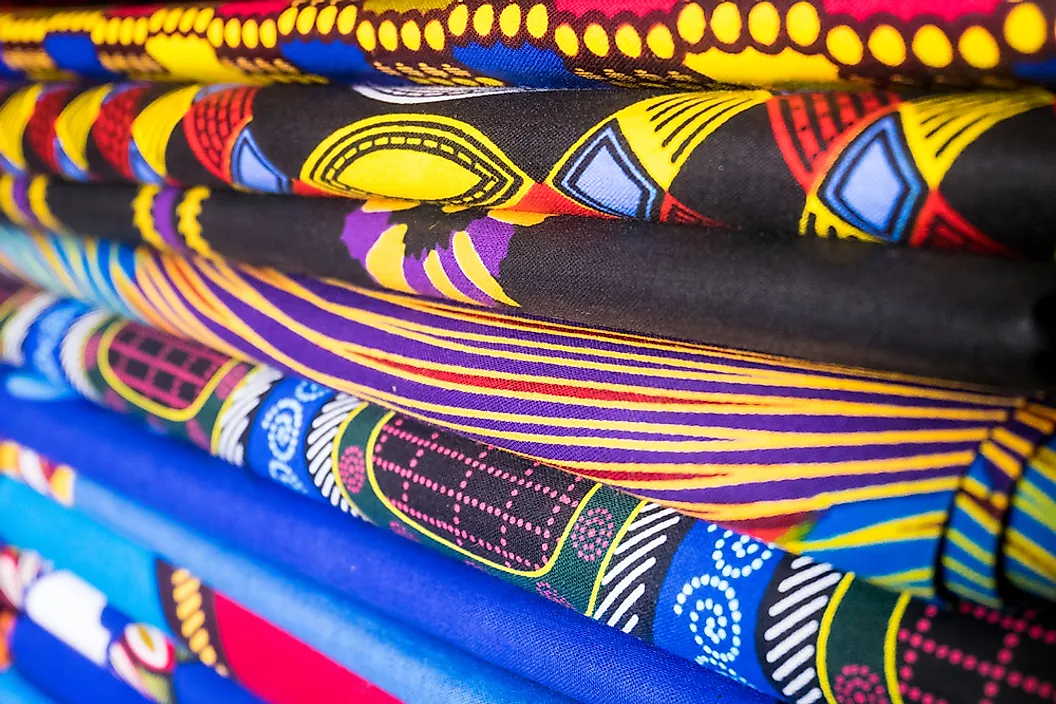

Nigeria Traditions
Nigerian traditions are wide and vary in the different cultures. For example, it is typical for Nigerians to have three weddings, unless they are getting married to foreigners. The first wedding is traditional, the second one being in a court, while the third is in the church or the mosque. The rationale behind these weddings is that the union needs to be recognized by religion, the law, and by tradition. Other traditions include the mother-in-law helping the daughter-in-law after giving birth and younger men going for apprenticeships with older and wealthier men.


Nigerian Food
Nigerian food is mostly made up of meals that are high in carbohydrates, such as cassavas, rice, maize, yams, and plenty of vegetables. There are many ways that these meals are prepared. For example, the cassavas can be ground up and the flour used to make a delicious and inexpensive porridge. The yams can be mashed or fried in oil. Meat is another delicacy that is prepared into something known as suya (a form of meat resembling barbecue meat) and wild meat (from giraffes and antelopes). Most of the foods are spicy, especially in the west and the south. Other forms of traditional food include fufu, eba, okra, egusi, and ogbono. Drinks include traditional brews like palm wine.

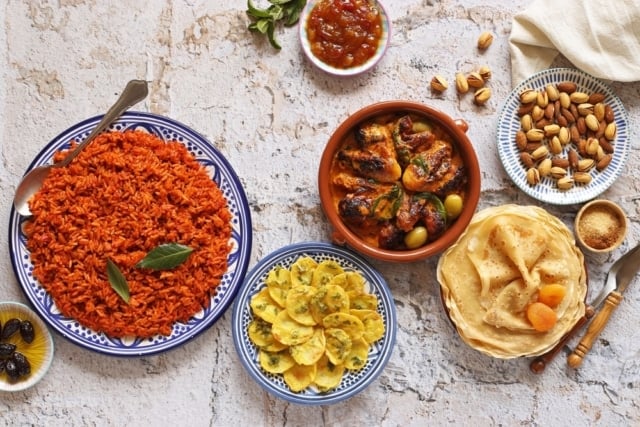
Nigerian Clothing
Nigeria itself is home to several textile industries that go towards clothing the Nigerian people. Fashion is diverse and varies depending on the ethnic groups, culture, and religion. In recent time, the styles have evolved to more contemporary designs. Traditionally, cultures such as the Yoruba used to wear clothing such as gele (a cloth wrapped around the head by women), afbada (a robe for formal functions), and other forms of attire. Other cultures, such as the Igbo used to wear clothes only for modesty in past times, which is unlike other cultures where clothing has always been a symbol of status.

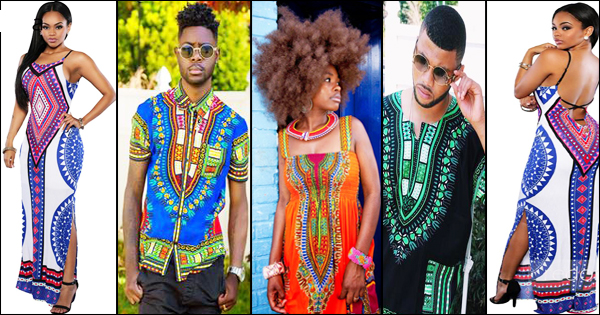
Family Life
Families are a crucial aspect of Nigerian society and are typically larger than in the west. The larger number of families is because a higher number of children improves the social standing of a man. For this reason, newborns are regarded with joy and pride as they are the future. In some of Nigeria’s northern states, polygamy is legal and men may marry several wives. However, none of the states in southern Nigeria allow this practice.


Language
Nigeria’s culture is made up of several ethnic groups that speak 527 different languages. The number of ethnic groups and dialects stand at more than 1,150. Some of the most prominent ethnic groups include the likes of the Fulani, Hausa, Igbo, Yoruba, and Ijaw. Minority ethnic groups live throughout the nation although higher concentrations of these groups live in the northern and the middle regions of Nigeria.
LOLA RAE
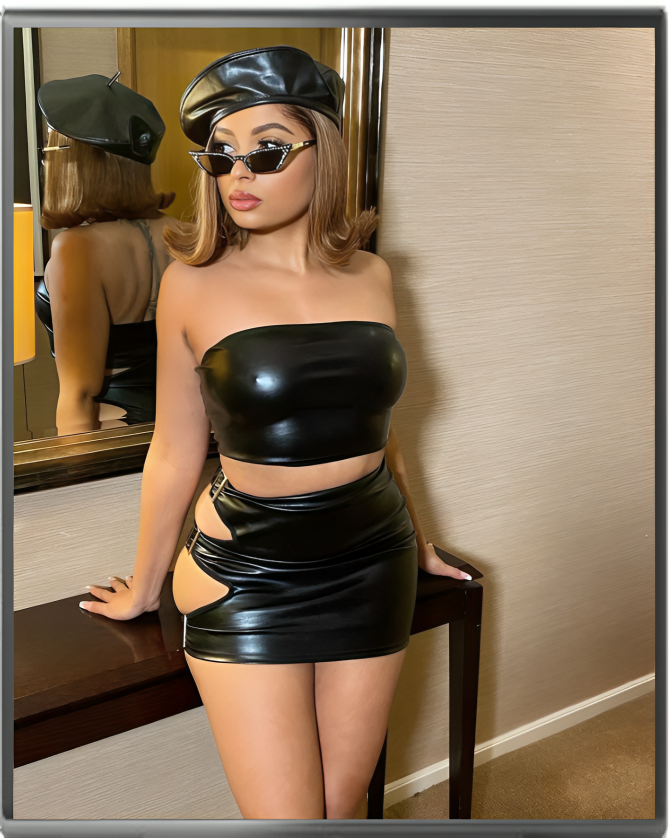
Luca Marzano
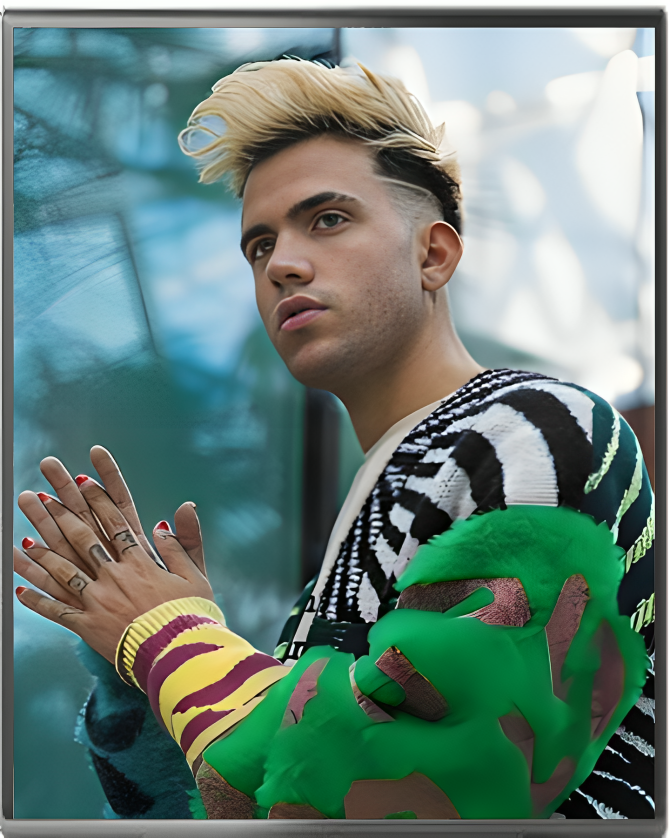


LATEST RELEASE
ALESSANDRA
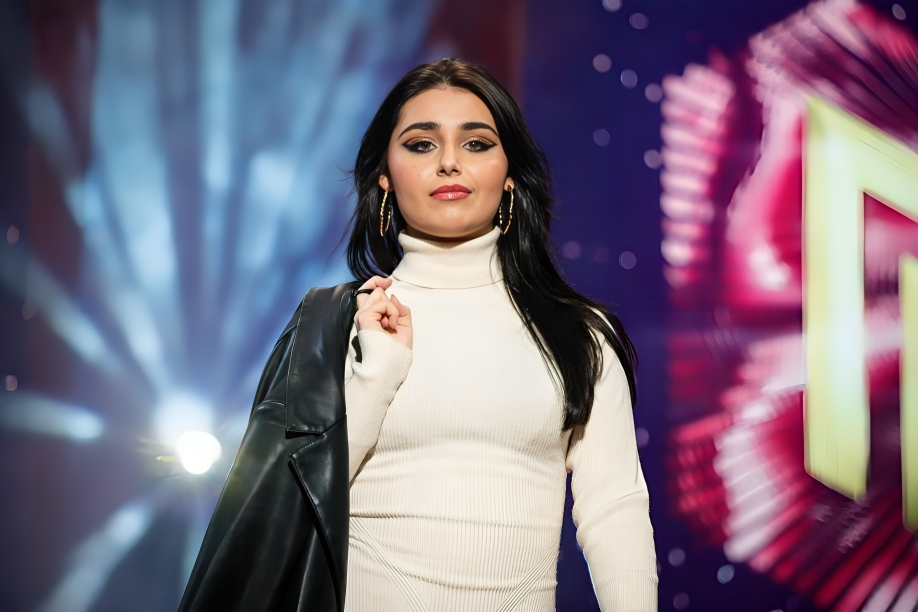
Alessandra Watle Mele (born 5 September 2002), known mononymously as Alessandra, is an Italian-Norwegian singer. She competed in the seventh season of The Voice…
NONSO BASSEY
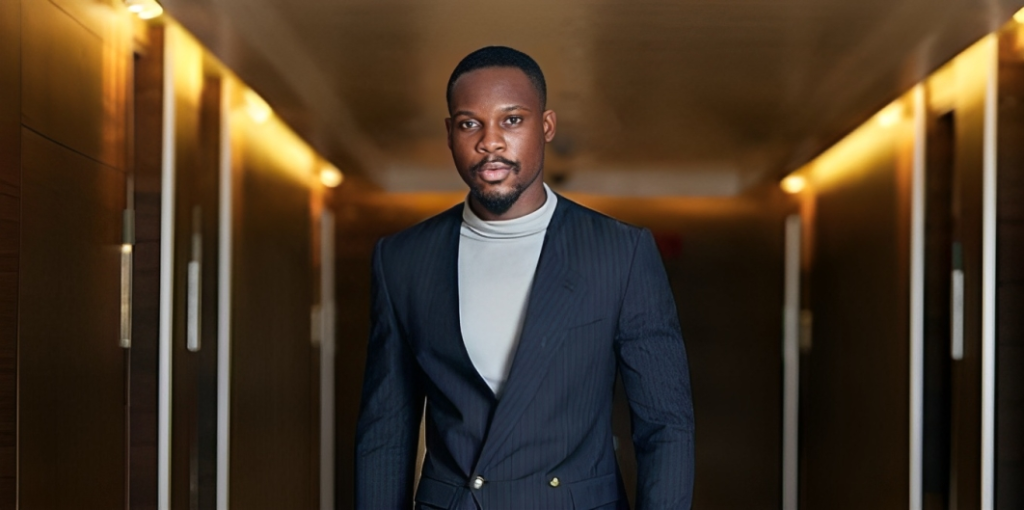
Chukwunonso Anozuma Bassey Iwuchukwu, popularly known as Nonzo Bassey, and formerly known as Nonso Bassey, is a Nigerian singer, songwriter, actor and model. He was…
FEDERICA ABBATE

Federica Abbate (born in 1991) is an Italian composer, lyricist and singer songwriter. Abbate started playing piano at 5 years old and graduated in sociology. In 2013 she won a contest…
EMMA MARRONE
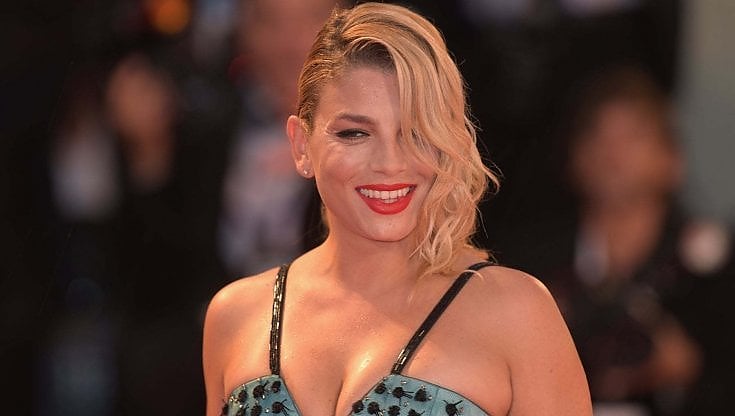
Emmanuela “Emma” Marrone (born 25 May 1984), known professionally as Emma, is an Italian pop singer, songwriter, and actress. After working with several bands, she won…
PAUL PLAY DAIRO
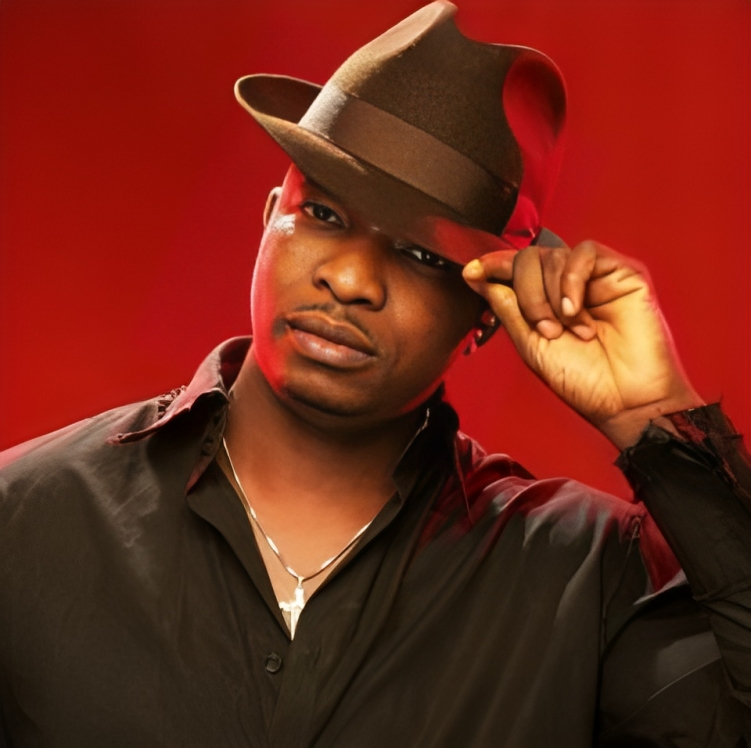
Paul “Play” Dairo is a Nigerian musician, singer, and songwriter. He is best known for his songs “Angel Of My Life,” “Forever,” and “You and Me.” In 1999, under the music…
VIOLETTA ZIRONI

Violetta Zironi (born 5 April 1995) is an Italian singer-songwriter and actress. In 2013, she took part in season 7 of the Italian version of The X Factor with her ukulele which soon became her…
FEDERICA CARTA

Federica Carta (born 10 January 2003) is an Italian singer songwriter and TV personality. In 2017, she came third in the 16th series of the Italian talent show Amici di Maria De Filippi…
CHIKE
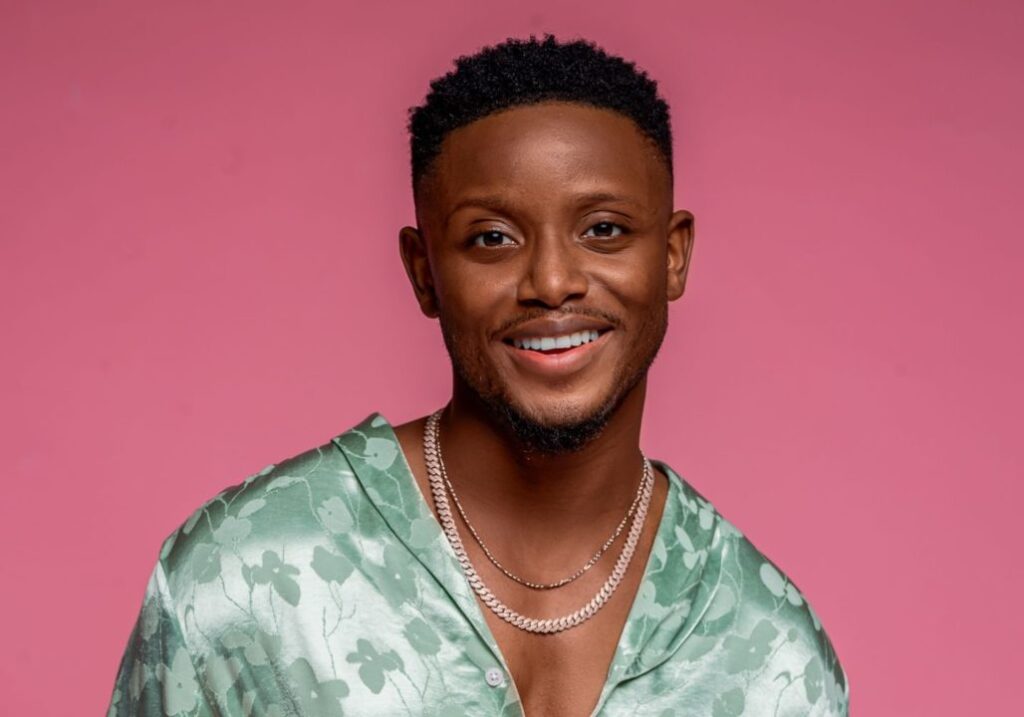
Chike Ezekpeazu Osebuka, born on January 28, 1993, is a Nigerian singer, song writer and actor. He is recognized by his stage name Chike. Chike gained prominence by participating in…
IVANA SPAGNA
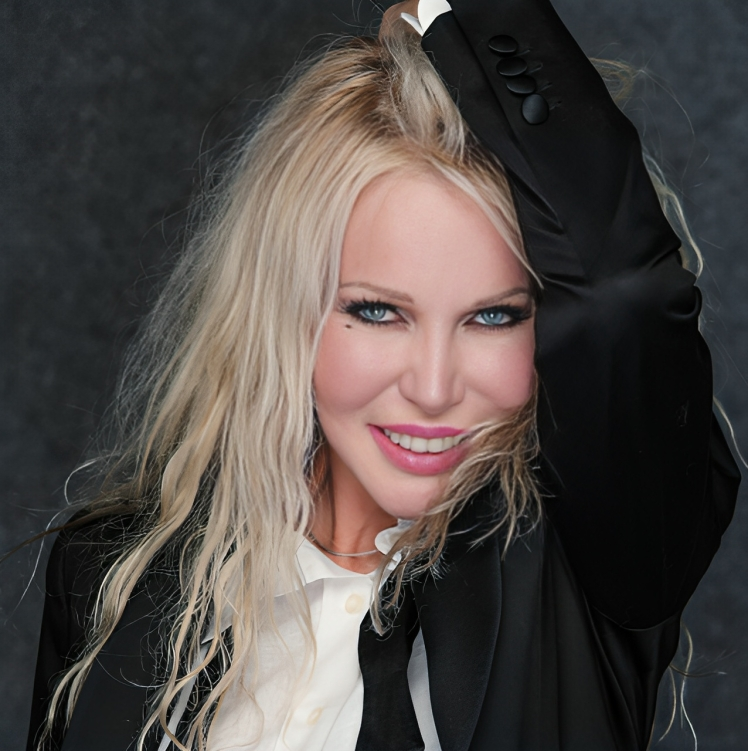
Ivana Spagna (born 16 December 1954), also known simply as Spagna, is an Italian singer-songwriter. She is best known for her worldwide hit song “Easy Lady”, released in…
NOEMI
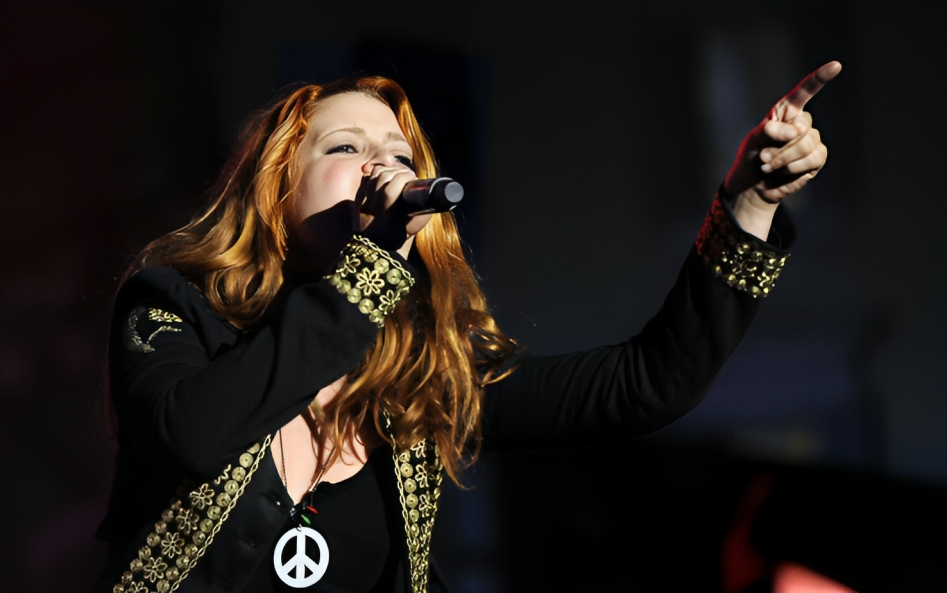
Noemi ( born Veronica Scopelliti on 25 January 1982) is an Italian singer-songwriter. She rose to fame in 2009, after competing in the second season of Italian talent…
PATORANKING
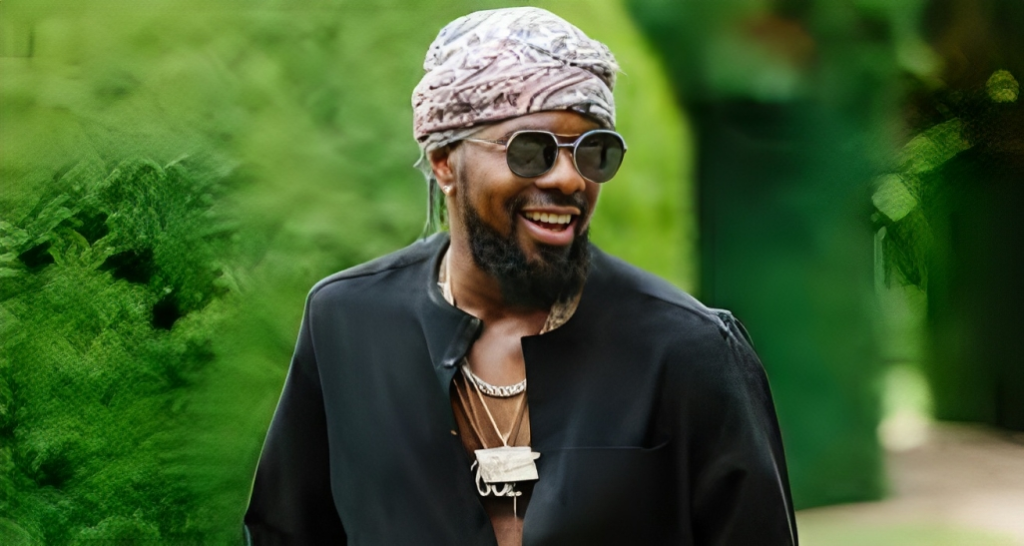
Patrick Nnaemeka Okorie (born 27 May 1990), better known by his stage name Patoranking, is a Nigerian reggae-dancehall singer and songwriter. Born and raised in Ijegun-Egba…
MANUELA VILLA
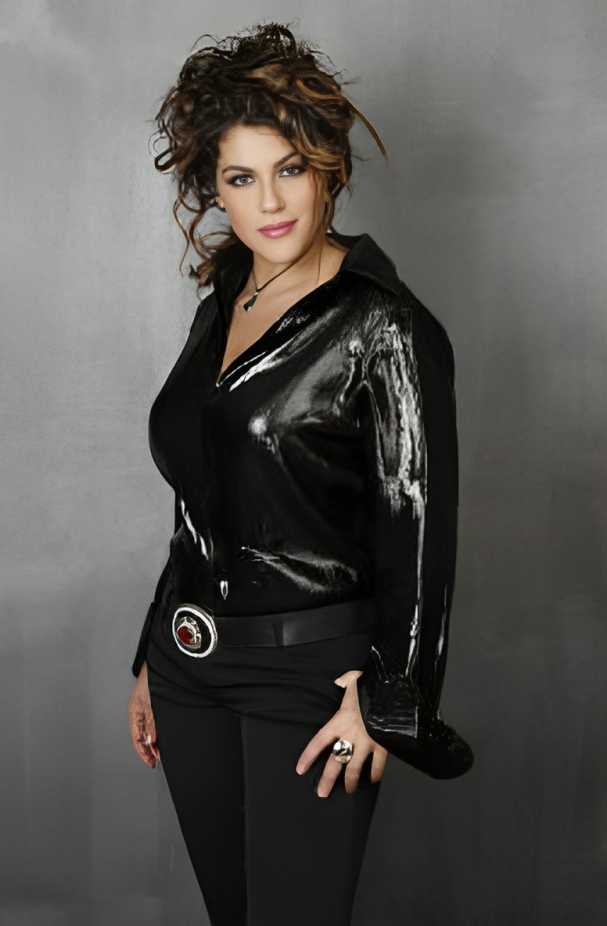
Manuela Villa pseudonym of Manuela Maria Garofalo Pica (Rome , 7 February 1966), is an Italian singer and actress. Born Manuela Maria Garofalo Pica daughter of singer….
ANNA OXA
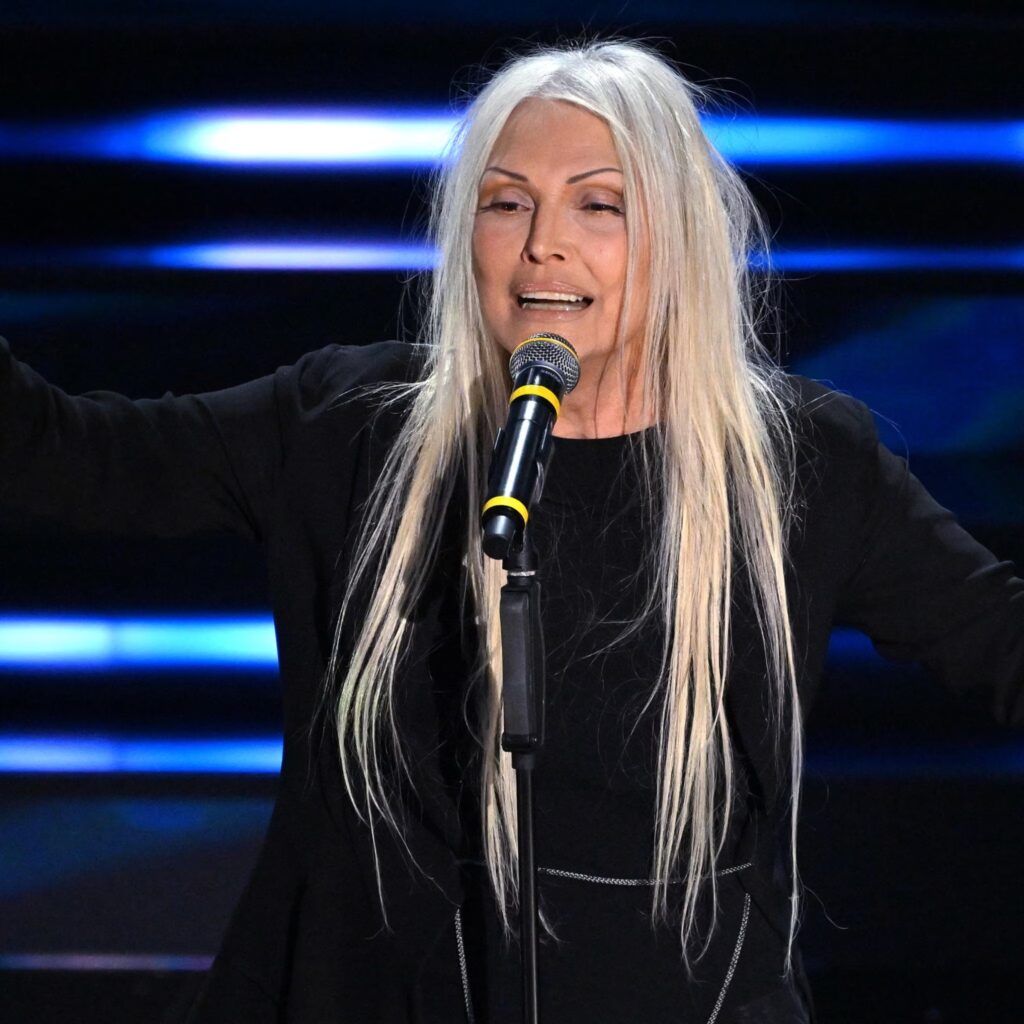
Anna Hoxha (born 28 April 1961), known professionally as Anna Oxa , is an Italian singer, actress, and television presenter. Oxa has received mainstream popularity and recognition…
TEKNO MILES
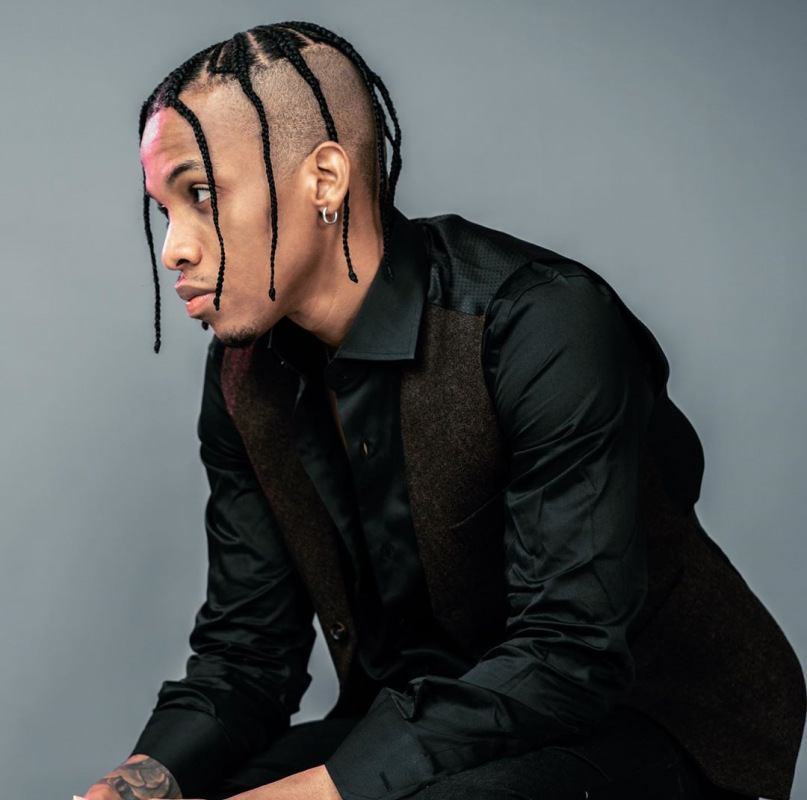
Augustine Miles Kelechi Okechukwu (born 17 December 1992), popularly known as Tekno, is a Nigerian singer and songwriter and Record producer. His song…
GIOCONDA
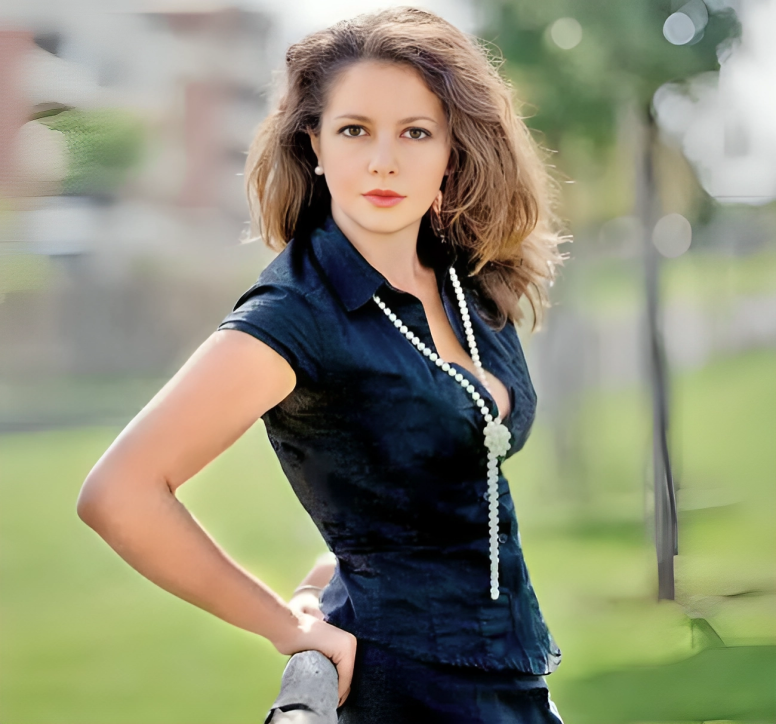
Gioconda Vessichelli is an Italian opera singer and actress. Gioconda is the inventor and pioneer of BollywoOPERA style. She obtained two degrees with maximum marks from…
GIORGIA GUEGLIO
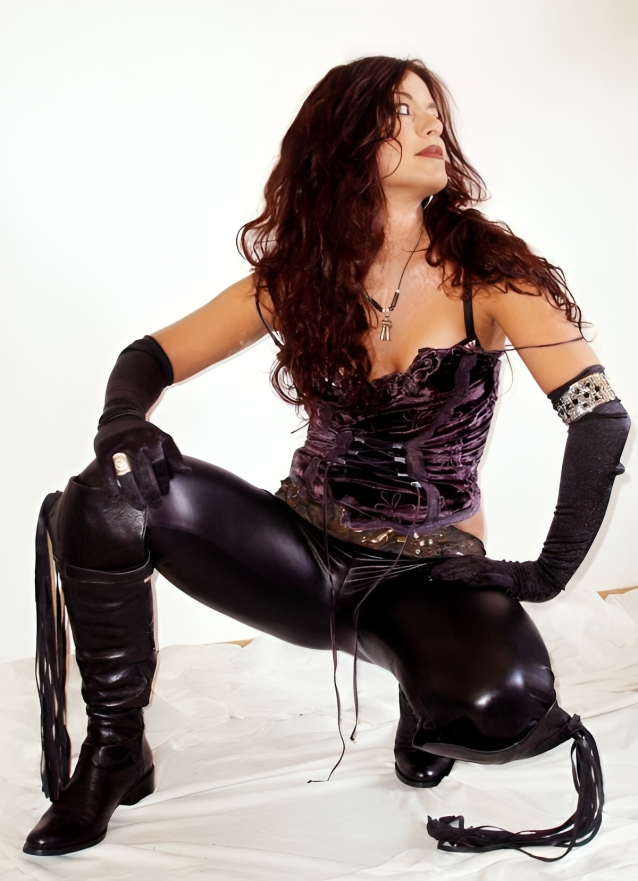
Giorgia Gueglio (born 1973) is an Italian singer and founding member of the heavy metal band Mastercastle. She started singing in 1990, following her passion for singers like David…
ORNELLA VANONI
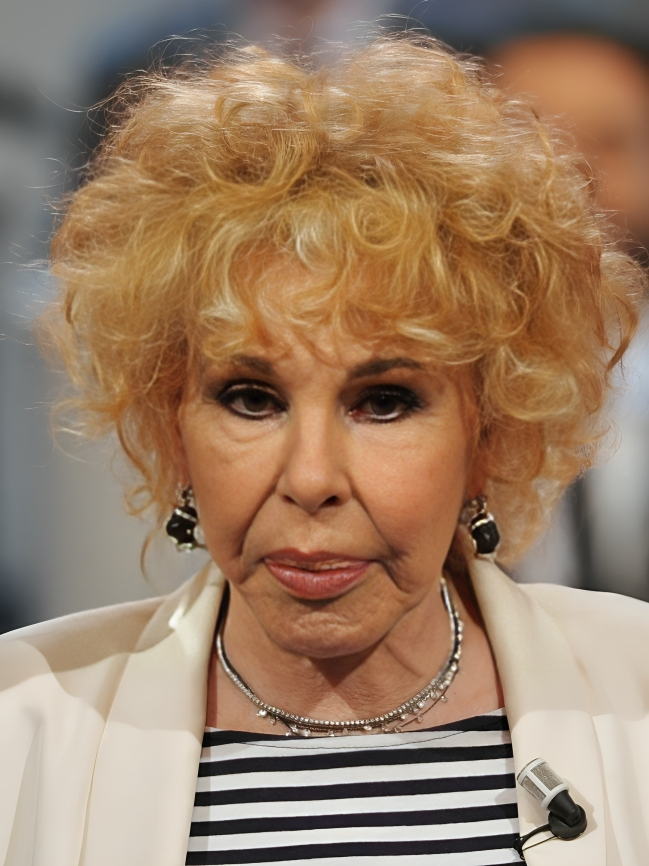
Ornella Vanoni OMRI (born 22 September 1934) is an Italian singer-songwriter and actress. She is one of the longest-standing Italian artists, having started performing in 1956. She has…
GIANNA
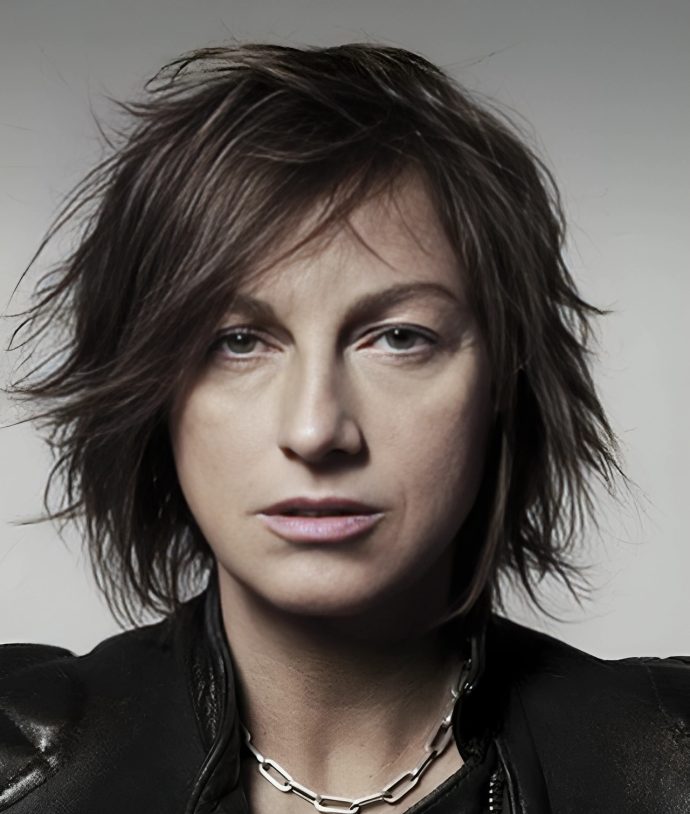
Gianna Nannini (born 14 June 1954) is an Italian singer and songwriter. Her most notable songs include “America” (1979), “Fotoromanza” (1984), “I Maschi” (1987) and “Bello e impossibile”…
LOREDANA BERTÉ
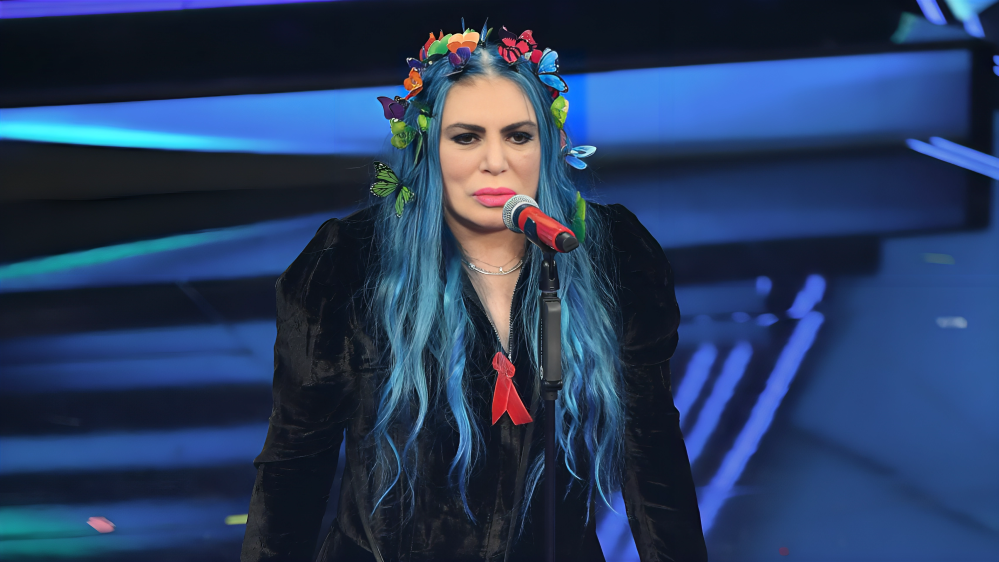
Loredana Bertè (born 20 September 1950) is an Italian singer and actress. In her long career she has worked with prominent Italian songwriters such as Pino Daniele, Ivano Fossati,…
ELISA
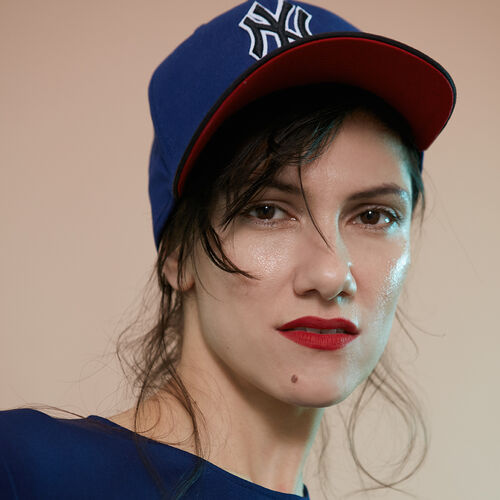
Elisa Toffoli (born 19 December 1977), performing under the mononym Elisa, is an Italian singer- songwriter. She is one of few Italian musicians to write and record mainly in English…
CRISTINA SCABBIA
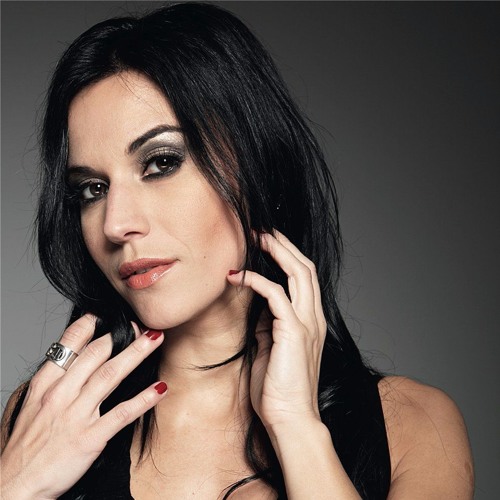
Cristina Adriana Chiara Scabbia (born 5 June 1972) is an Italian singer, best known as one of the two vocalists of gothic metal band Lacuna Coil. Scabbia used to write an advice column in…


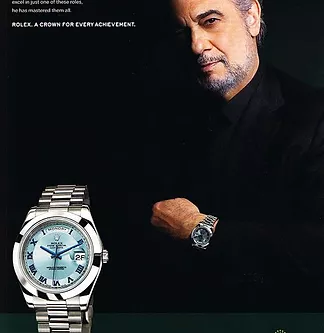

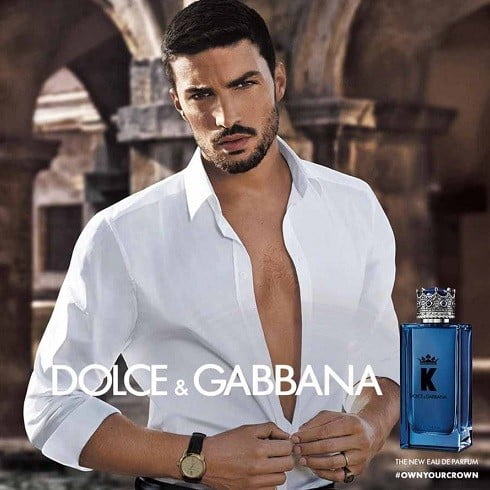

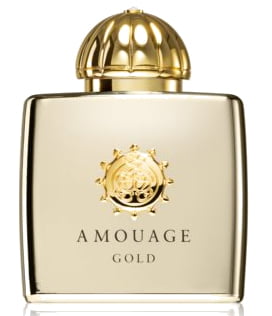
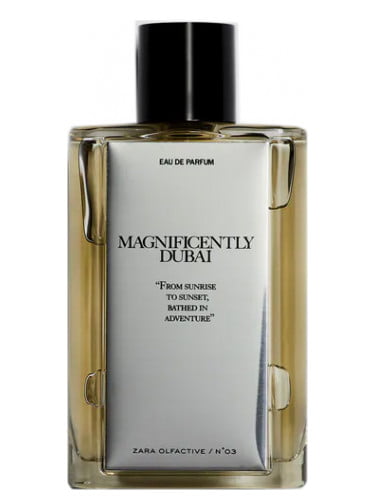
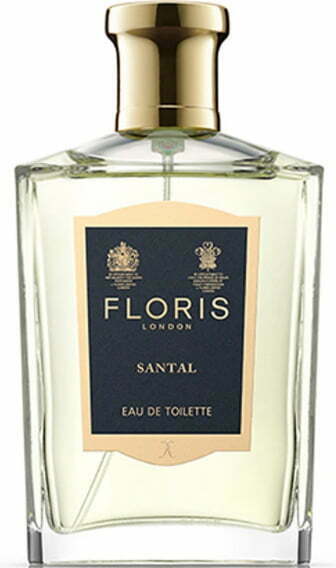
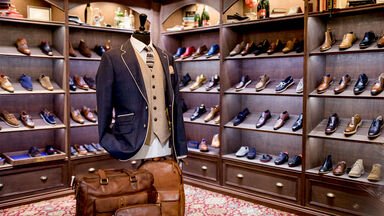
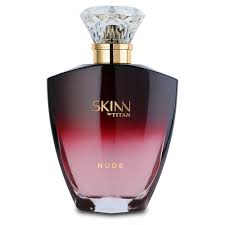
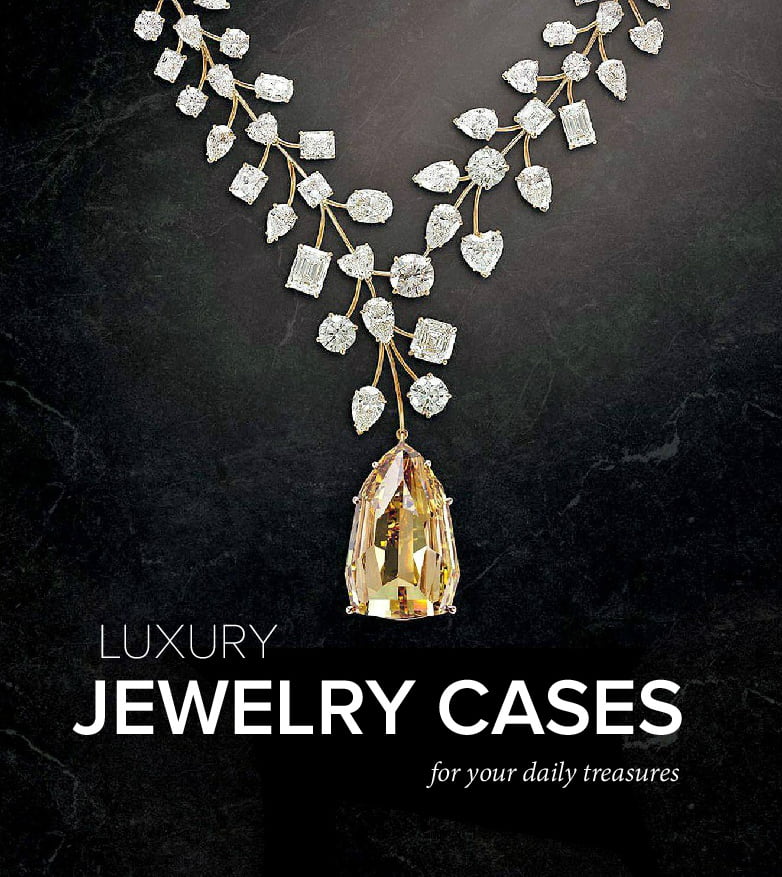

ALESSANDRA

Alessandra Watle Mele (born 5 September 2002), known mononymously as Alessandra, is an Italian-Norwegian singer. She competed in the seventh season of The Voice…
NONSO BASSEY

Chukwunonso Anozuma Bassey Iwuchukwu, popularly known as Nonzo Bassey, and formerly known as Nonso Bassey, is a Nigerian singer, songwriter, actor and model..
FEDERICA

Federica Abbate (born in 1991) is an Italian composer, lyricist and singer songwriter. Abbate started playing piano at 5 years old and graduated in sociology. In 2013 she won a contest…
EMMA

Emmanuela “Emma” Marrone (born 25 May 1984), known professionally as Emma, is an Italian pop singer, songwriter, and actress. After working with several bands…
PAUL PLAY

Paul “Play” Dairo is a Nigerian musician, singer, and songwriter. He is best known for his songs “Angel Of My Life,” “Forever,” and “You and Me.” In 1999, under the music…
VIOLETTA

Violetta Zironi (born 5 April 1995) is an Italian singer-songwriter and actress. In 2013, she took part in season 7 of the Italian version of The X Factor with her ukulele which soon…
FEDERICA

Federica Carta (born 10 January 2003) is an Italian singer songwriter and TV personality. In 2017, she came third in the 16th series of the Italian talent show Amici di Maria De Filippi…
CHIKE

Chike Ezekpeazu Osebuka, born on January 28, 1993, is a Nigerian singer, song writer and actor. He is recognized by his stage name Chike. Chike gained prominence by participating in…
IVANA SPAGNA

Ivana Spagna (born 16 December 1954), also known simply as Spagna, is an Italian singer-songwriter. She is best known for her worldwide hit song “Easy Lady”, released in…
NOEMI

Noemi ( born Veronica Scopelliti on 25 January 1982) is an Italian singer-songwriter. She rose to fame in 2009, after competing in the second season of Italian talent…
PATORANKING

Patrick Nnaemeka Okorie (born 27 May 1990), better known by his stage name Patoranking, is a Nigerian reggae-dancehall singer and songwriter….
MANUELA

Manuela Villa pseudonym of Manuela Maria Garofalo Pica (Rome , 7 February 1966), is an Italian singer and actress. Born Manuela Maria Garofalo Pica….
ANNA OXA

Anna Hoxha (born 28 April 1961), known professionally as Anna Oxa , is an Italian singer, actress, and television presenter. Oxa has received mainstream…
TEKNO MILES

Augustine Miles Kelechi Okechukwu (born 17 December 1992), popularly known as Tekno, is a Nigerian singer and songwriter and Record producer. His song…
GIOCONDA

Gioconda Vessichelli is an Italian opera singer and actress. Gioconda is the inventor and pioneer of BollywoOPERA style. She obtained two degrees with…
GIORGIA

Giorgia Gueglio (born 1973) is an Italian singer and founding member of the heavy metal band Mastercastle. She started singing in 1990, following her passion for singers like David…
ORNELLA

Ornella Vanoni OMRI (born 22 September 1934) is an Italian singer-songwriter and actress. She is one of the longest-standing Italian artists, having started performing in 1956. She has…
GIANNA

Gianna Nannini (born 14 June 1954) is an Italian singer and songwriter. Her most notable songs include “America” (1979), “Fotoromanza” (1984), “I Maschi” (1987) and “Bello e impossibile”…
LOREDANA

Loredana Bertè (born 20 September 1950) is an Italian singer and actress. In her long career she has worked with prominent Italian songwriters such as Pino Daniele, Ivano Fossati,…
ELISA

Elisa Toffoli (born 19 December 1977), performing under the mononym Elisa, is an Italian singer- songwriter. She is one of few Italian musicians to write and record mainly in English…
CRISTINA

Cristina Adriana Chiara Scabbia (born 5 June 1972) is an Italian singer, best known as one of the two vocalists of gothic metal band Lacuna Coil. Scabbia used to write an advice column in…

